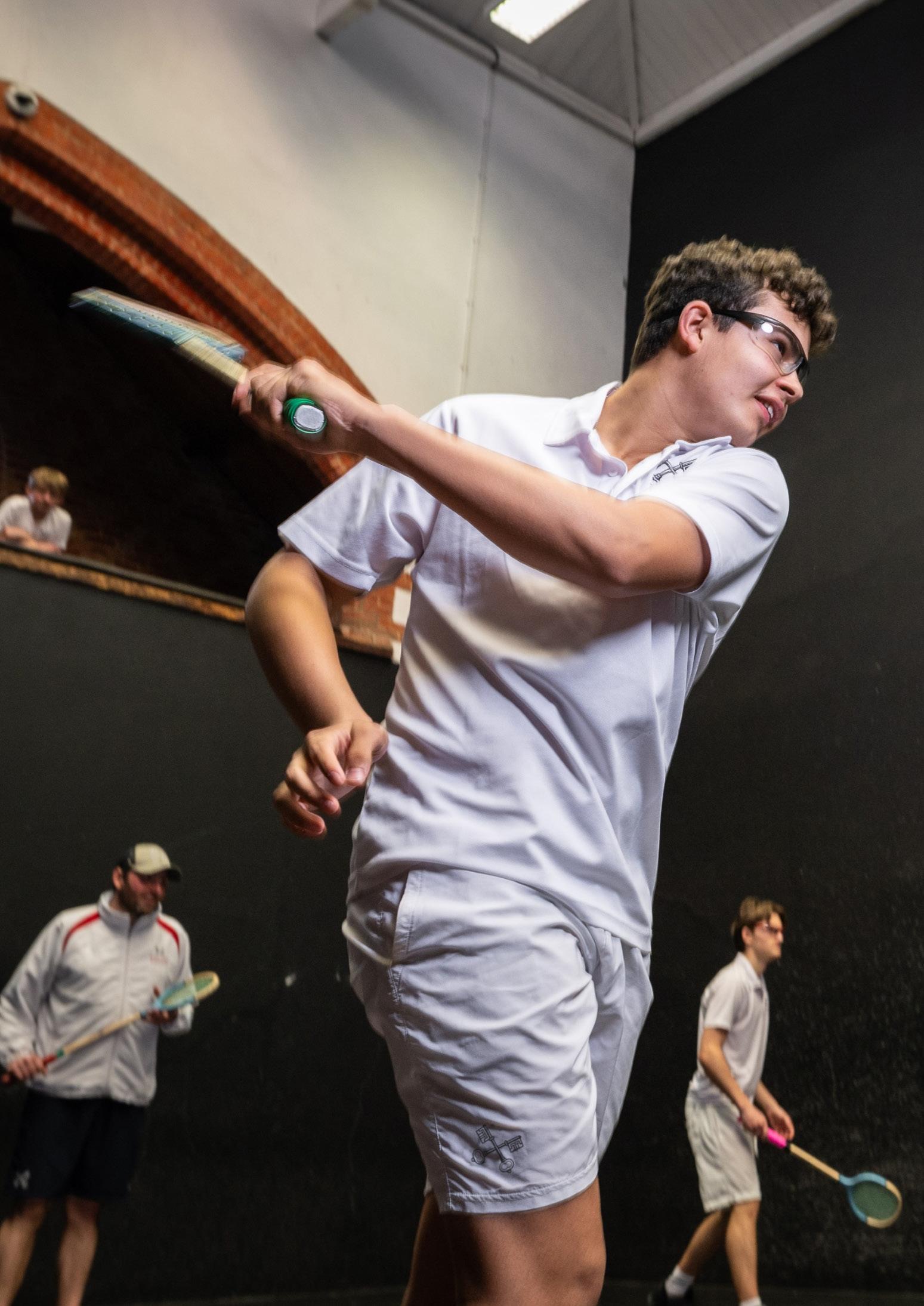

THERADLEIAN

From the WARDEN
Let me go back to the last week of the Lent Term. Not content with having taken 73 boys to Salamanca at Leave-Away or with two quartets qualifying for the ProCorda national ensemble finals, the Music Department went into overdrive. Battle of the Bands saw seven groups take to the stage in front of a packed theatre – a great evening of entertainment. There was a magnificent performance of Haydn’s Mass in Time of War (along with many other pieces) in Chapel. Two weekly concerts. A Music Scholars’ recital. And the magnificent Mighty Orchestra event in Oxford Town Hall, in collaboration with over 150 primary school pupils as the culmination of this year’s Music Flood events (which has offered over 4,500 musical opportunities to local children). Not to mention some rousing hymns in Chapel. All in a week.
I focus on the music side of things, of course, in order to accompany the picture opposite, showing progress on the new Music School: to be complete, we hope, by the end of the calendar year. As you can see, it is taking shape! We are excited about the new facility: with 30 rehearsals a week and over 500 regular music lessons, we need the space. It will be a fitting environment to house the ambition, variety and dynamism of Radley’s music.
The Music School is the last of the major projects associated with the expansion of the College to over 750 pupils, a process which we started planning ten years ago. We are used now to the Chapel Extension, to L Social, the new fitness centre, the Lecture Theatre and the refurbished – and extended – Science block. It is exciting to see the final piece in the jigsaw.
It is, though, what happens in buildings that matters most, not merely the fact of the facilities themselves. Which is why I refer to the actual concerts: boys using the opportunities they have. All happening, of course, at the same time as national rugby, rackets and rowing tournaments. At the same time as coursework deadlines and language orals. As interSocial tournaments reach their conclusion.
I always say to prospective parents that we are fortunate enough to have a great location and fantastic facilities . . . but it is only a very small part of what we are. Look at the new building; admire it by all means. But not for the aesthetics only: much more for what will go on within it. As is true of every building, classroom, pitch and Social . . . where a Radley education happens day by day, term by term, year by year. Enjoy this edition of The Radleian .
Meet
ED JAMES
Ed James joined the College in April 2024 as Deputy Head (Pastoral) from Millfield, where he was Head of Sixth Form. Prior to this, he spent five years at Merchant Taylors’ School as Assistant Head of Upper School and Head of Politics. Ed’s teaching career began at Pimlico Academy where he taught A-Level Government & Politics, Key Stage 3 History and Geography and, alongside that, ran a programme encouraging pupils towards university and employment. A year into his role at Radley, we were delighted to sit down with Ed to find out more about his experience so far and ask him a few other important questions
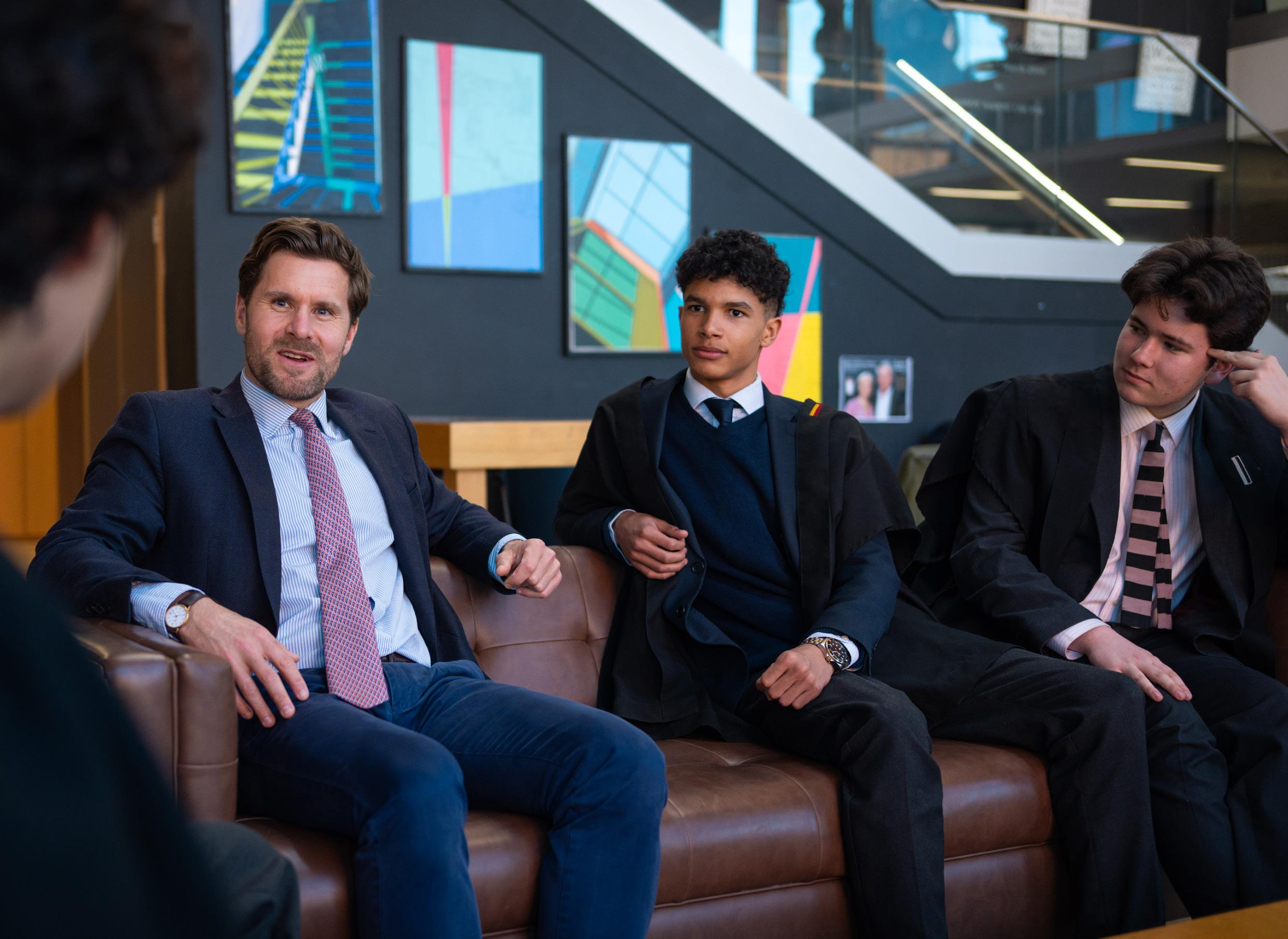
What has impressed you most about Radley so far?
The genuine warmth of the community; staff and boys. Before I started, I read Christopher Hibbert’s history of the College and his chosen title, No Ordinary Place, couldn’t be more apt.
What has been the biggest challenge?
The daily battle I fight to resist the delicious puddings Pam and her team lay on in Hall.
Favourite sport?
One of the best things about moving to Radley has been the opportunity to play more golf with my son on the 9-hole course. His game is rapidly improving whilst mine remains stubbornly mediocre.
Favourite book?
I’ve done quite a bit of travelling in India (although there’s so much more to do) and Rohinton Mistry’s novel, A Fine Balance, set in the country in the 1970s, is a book I love.
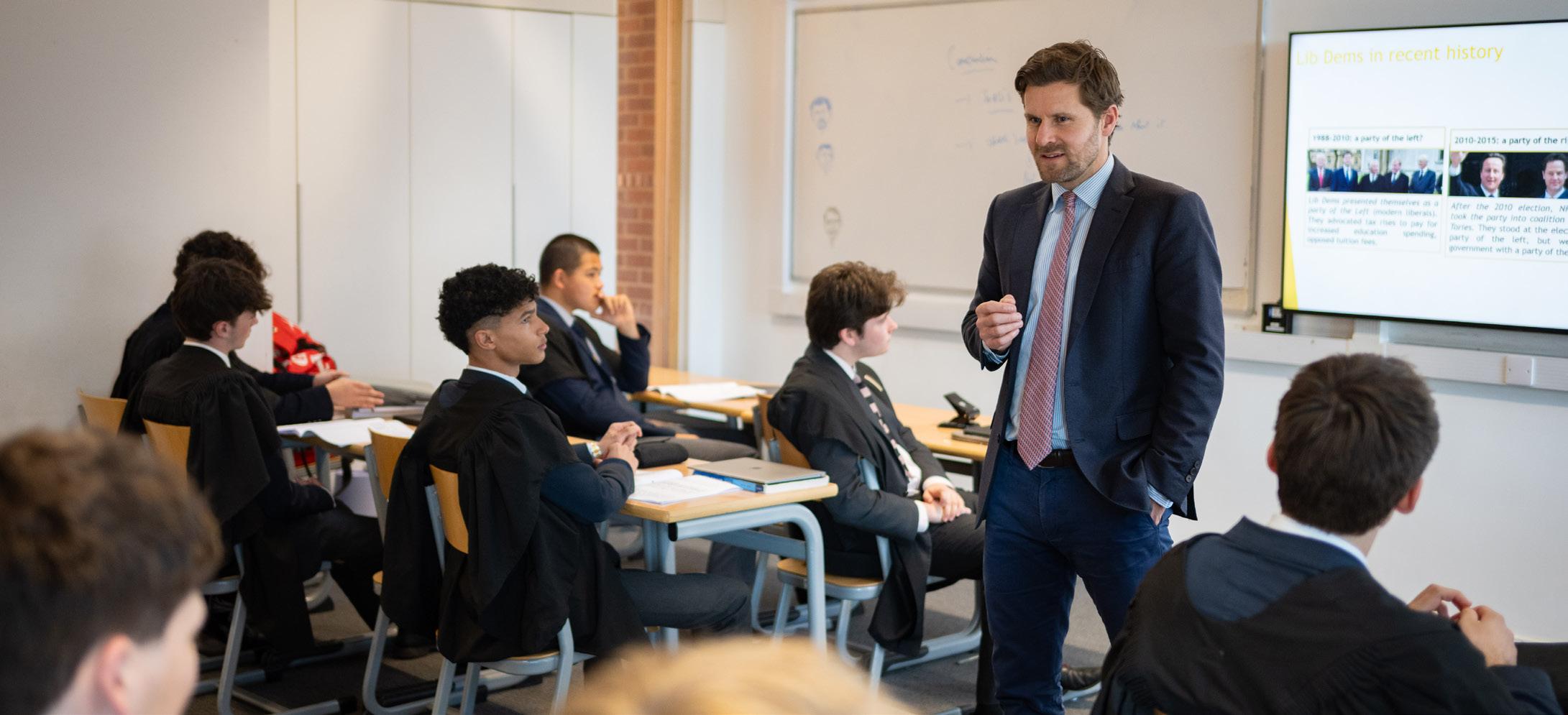
Are you attached to a Social?
No, and the great thing about that is that it affords me the chance to get into each Social to experience their individual character.
What is your dream job?
My all-time favourite TV series is The West Wing and my favourite character in it is Josh Lyman, Deputy Chief of Staff to the President. As a student of politics and a fan of the show, the idea of working in the White House is pretty unbeatable.
Dream dinner party guests and what story would you tell them?
Roy Jenkins, Alex Ferguson, George Orwell, Hilary Mantel, Haruki Murakami, Robert Harris, Rose Tremain. I think it would be far more interesting to hear their stories than tell any of my own.
Do you have a favourite Radley quirk?
It’s anything but a quirk, but my favourite thing about Radley is Chapel. Clichéd as it sounds, it is the heartbeat of the College.
Sports Round-Up
James Gaunt, Director of Sport, gives us an overview of sporting success since the beginning of the academic year.
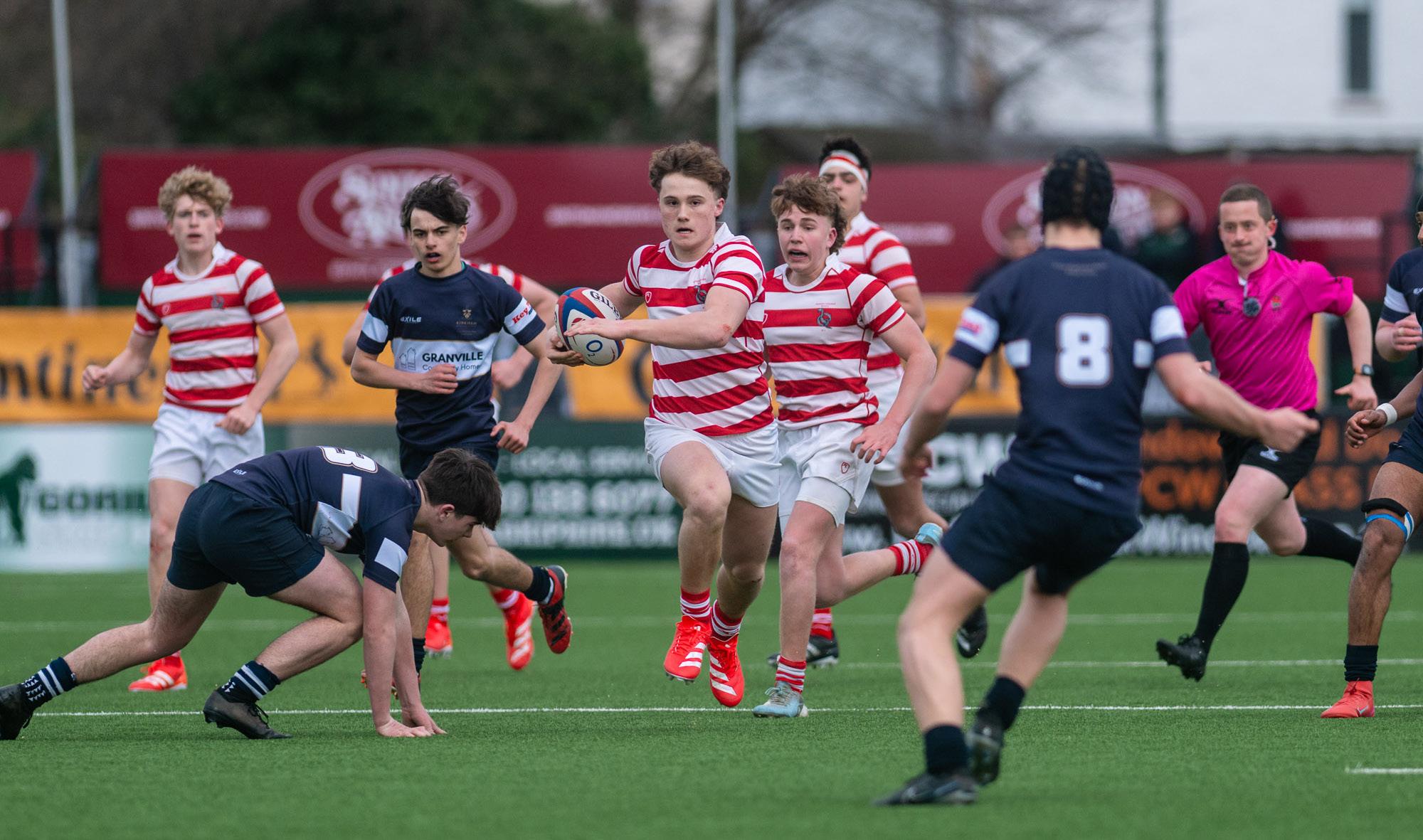
RUGBY
As another successful rugby season draws to a close, there is much to celebrate. Before the Michaelmas Term started, 37 boys and six staff spent 16 days touring Argentina, the College’s first long-haul rugby tour in a decade.
For the third season in a row, over 460 Radleians played rugby, almost two-thirds of the student body, with several of the club’s 24 teams posting unbeaten seasons. RCRUFC continues to show its strength at the top and through the ranks and, drawing the 15-a-side season to a close, JC1 secured the College’s second national trophy in as many years when they won the U15 Schools Plate final.
With the focus on Rugby Sevens in the Lent term, both the Midgets and the Colts made it through the second day of Rosslyn Park –invaluable experience and skill development ahead of next season, all in the glorious spring sunshine. As the Summer term approaches, the various squads are set to begin their preparation for the 2025 season.
CROSS COUNTRY
Since the founding of the Radley College Harriers and affiliation as an England Athletics registered club in 2021, the cross country team at Radley has gone from strength to strength. One of the key goals for the club has been the National Cross Country Cup, the premier competition of the Michaelmas Term with 600 schools taking part this year. Having
progressed to the regional stage in the three previous editions, our intermediate team made school history qualifying for the National Cup final for the first time. Their consistency and application in training was rewarded with a 17th place finish out of the 27 qualifying schools on a tricky and testing course at Leeds Grammar School.
County representation is another accolade that has seen recent Radley successes, with George (S, F) and James (R, K) achieving their Oxfordshire debuts at the English Schools Cross Country Championships. Additional medal-winning performances include a 2nd place finish for the Juniors at the Harrow Ten Schools fixture, 3rd place finish for the under-15s at the Berks, Bucks & Oxon Cross Country Championships and podium finishes at the Radley Relays for our Junior and Intermediate teams. The squad will now be turning their attention to converting successful winter endurance onto the track for the athletics season.
ROWING
As has seemed to be the norm in the past few years, much of Lent Term for the younger year groups was spent off the river and on a lake or in the ergo room, with the River Thames continuing to flow fast and high. This did not stop progress, however, and a number of crews competed throughout the term at the traditional tideway head races, building momentum.
The pinnacle of the term is always the Schools’ Head, and for the Shell crews, the Scullery Head at Dorney Lake. We took eight crews to the Schools’ Head, with solid performances across the board and a strong win for our 3rd VIII, taking home the pennant.
In the Scullery, the A boat secured an impressive seven second win against a strong field over the 3.6 km course. All year groups were heading off to Easter Training Camps to prepare themselves for the summer racing season, with the Fifths and Sixth Form in Portugal, Removes in Nottingham and the Shells here at Radley.
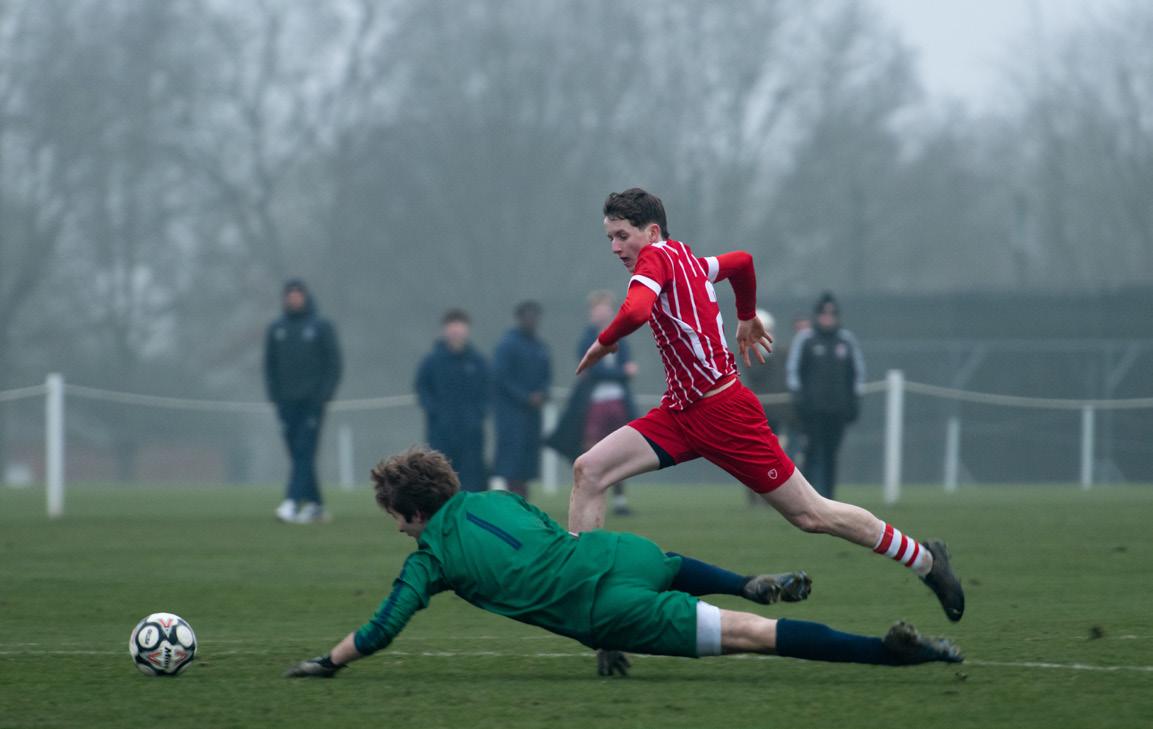
FOOTBALL
RCAFC saw a number of new initiatives introduced this season, including a worldclass pre-season tour to the Etihad Complex at Manchester City, the regular use of VEO (Video Enhanced Observation) footage to analyse performances, early entry into the ISFA Cup and the use of Tilsley Park during bad weather.
The club won or drew 61% of the 104 matches played in 2025, and won most block fixtures played including against Harrow, Haileybury, Marlborough, Teddies and Wellington.
In the Seniors, the 3rd XI won the Central Independent School League, a fitting tribute to departing coach, Mr Jewell. Tony (6.1, G) picked up the Senior Golden Boot with nine goals. The 2nd XI also performed well in their league and narrowly finished runners-up to Teddies. The 5th XI recorded an unbeaten season and Archie (6.2, A) picked up the Golden Glove award for fewest goals conceded. Whilst the 1st XI season wasn’t a vintage year, the emphatic 4-1 win over Abingdon was certainly the main highlight.
The future of the club also looks very bright with some stellar performances in the Junior section. Colts 2 had an almost unbeaten season and Harvey (V, A) picked up the Junior Golden Boot award scoring nine goals. Colts 1 saw an unbeaten streak of nine matches and Hugh (V, J) won the Junior Golden Glove award for some heroic moments in goal.
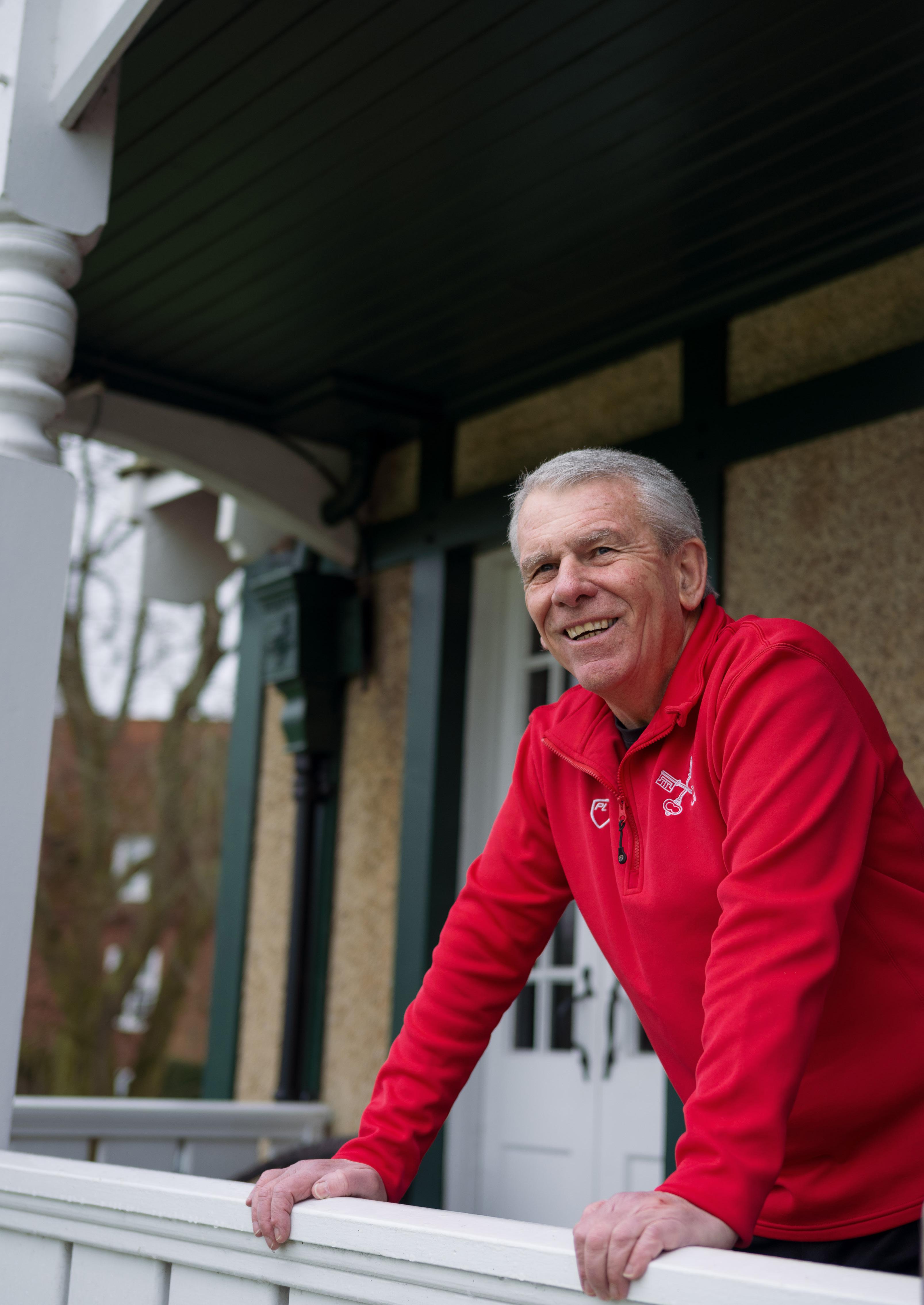
Howzat!
Master in Charge of Cricket, Simon Dalrymple, pays tribute to a very fine innings…
In September 2025 something strange will happen in OX14. The Radley year will start without Andy Wagner for the first time since 1985. In that time, Wags has worked under four Wardens and seven Masters in Charge of Cricket. An uncharitable conclusion would be that this turnover means working with Wags is somehow more stressful than running the College. What is certainly true is that Wags has become a Radley institution. Like Pelé, Plato and Cher, being known by just one name is a true marker of legendary status. Wags fits into that group seamlessly. Despite this, he is not a man to enjoy centre stage. However, it is important we spend some time paying tribute to an extraordinary career.
Wags has been a welcome point of consistency over his time at Radley. Indeed, if he had squeezed out a few more terms, he would have been able to tell some current students that he had coached their grandfather rather than just their dad. However, he has never been guilty of stagnation. His involvement in youth cricket away from Radley has kept him abreast of changes in the game and he was a trailblazer back in the mists of time when he instigated an off-season programme that other sports have sought to emulate in recent years. It was because of Wags that Radley cricket was ahead of the pack for so long and it is a tribute to his energy and professionalism that he has continued to develop the club throughout his time at the College.
On a different note, Wags was always much more than a cricket coach. I know there are boys who found a sanctuary in his company, and many feel they wouldn’t have made it through five years without his support and gentle guidance. He has accompanied many Radleians on
the first steps of their sporting journey in rugby and hockey as well as cricket and, in recent years, he has taken on the challenge of running JC2 football with customary good humour. Wags has been an excellent schoolmaster as well as an expert technical coach. His ability to make the complex appear simple extended beyond the mechanics of the cover drive to include expertise in guiding teenagers through choppy waters.
It is fitting that we finish by considering Wags’ contribution to schools’ cricket. It is no coincidence that his career encompassed a number of golden eras in Radley’s cricketing history. The unbeaten teams of the 90s, the Gubbins, Hearne, Marriott group of 2009-12 and the John Harvey and Cowdrey Cup double winning team in 2017 are obvious high points but, interestingly, Wags’ reminiscences tend to revolve around stories and individuals rather than high points in terms of team performance. The stories can be a little repetitive and, a warning from the wise, if you stand still for too long, he is likely to tell you that the absence of a cheeseboard at 1st XI lunches is a sure sign of general societal decay! That said, a lack of focus on results should not be confused with a lack of competitive spirit. His jaunty whistling as he walked around the boundary tended to find a new tempo as the game reached its climax. However, he had seen enough schoolboy sport to know that the process was as important as the outcome. He always kept a firm eye on the truly important outcomes – turning out quality individuals was at least as important as producing quality cricketers. Wags will leave a huge void at the heart of Radley cricket and we will endeavour to maintain his standards. We wish him, his loved ones and all his family the very best for the future.
Cricket at Radley
Clare Sargent, College Archivist, takes us through the history of cricket at Radley.
1853
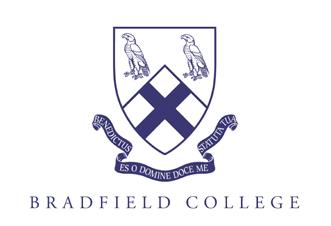
First match against another school. Radley lost to Bradfield.
The first oak planted in Century Clump. One for every boy who scored 100 for the 1st XI against another school 1900
William Collins (1858), the ‘Great Colenso’, becomes Radley’s first England international. 1886
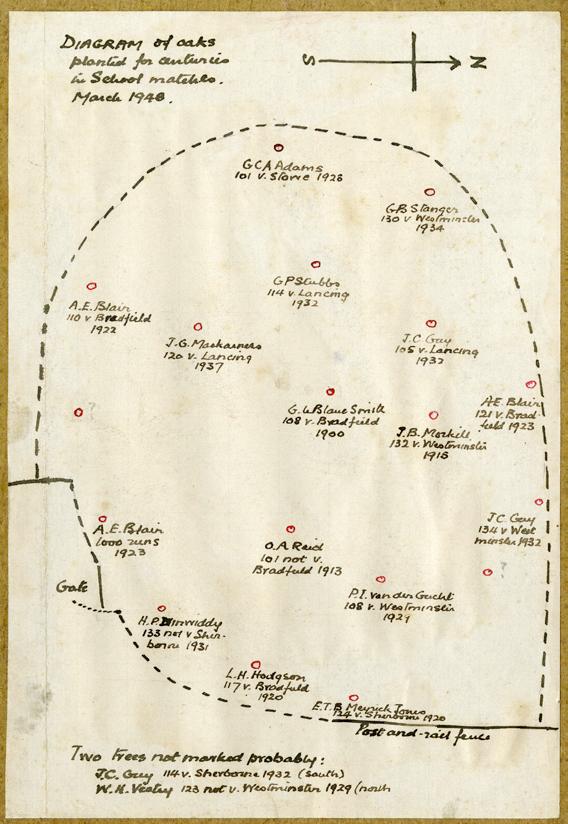
1847
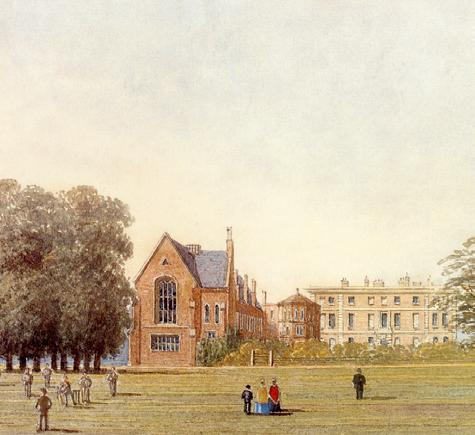
The earliest painting of Radley College (left) shows cricket being played on Bigside. 1859
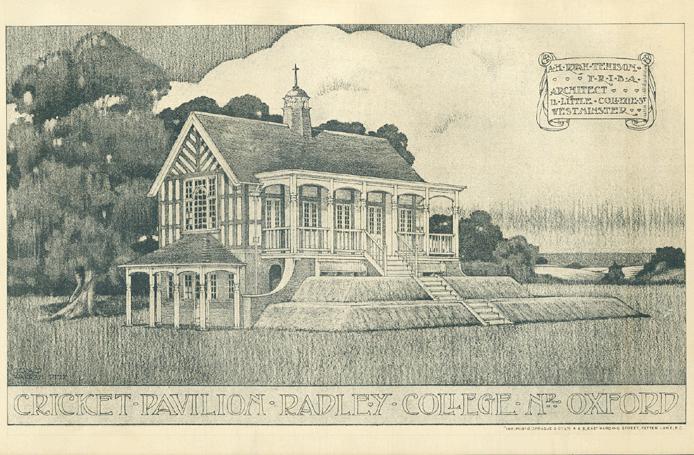
1897
“ The ‘Old Pavilion’ opens to commemorate the joint 50th anniversary of Radley College and the 60th anniversary of Queen Victoria.
A fine expanse of sward in the front, where boys could play cricket to great advantage.
One of the reasons Sewell and Singleton chose Radley Hall as the location for their new school.
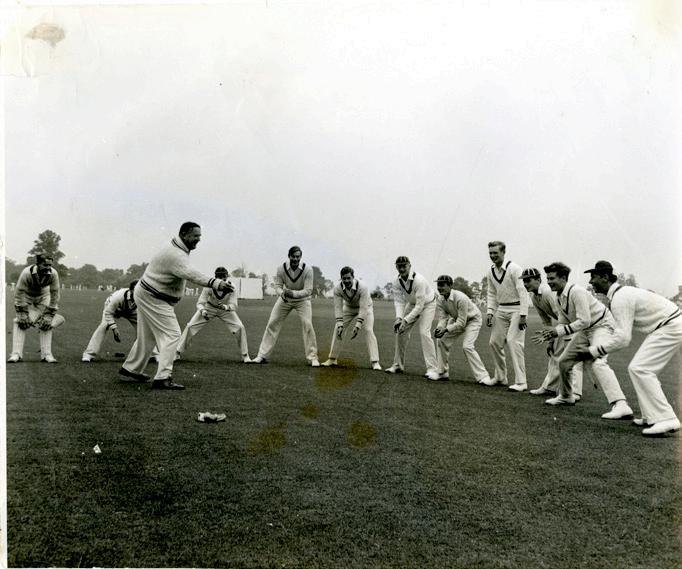
Bert Robinson succeeds Percy Mills as Radley’s Head Cricket Coach 1949
Unbeaten seasons –Radley’s team included the Dexter brothers and others selected for England Schoolboys. 1950-52
Ivor Gilliat becomes Master-in-Charge of Cricket. Ted Dexter said of him: 1937
Nothing that sullied the etiquette or the beauty of the game was tolerated. “
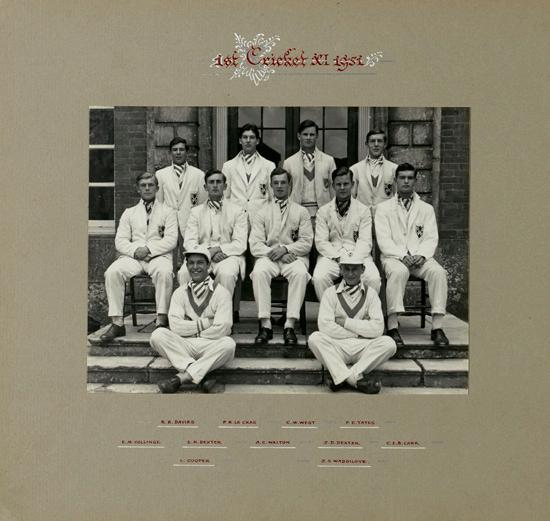
1960s
Ted Dexter becomes Radley’s first Test Cricketer and Captain of England: 62 Test matches (30 as Captain) over his career, scoring nine centuries and taking 66 wickets.
“
One
could say that the Ashes were won on the playing fields of Radley.
Henderson
2009 & 2010
England win, and retain, the Ashes.
2006
Jamie Dalrymple (1994, H) makes his international debut against Ireland. He went on to play in One Day Internationals and captain Glamorgan.
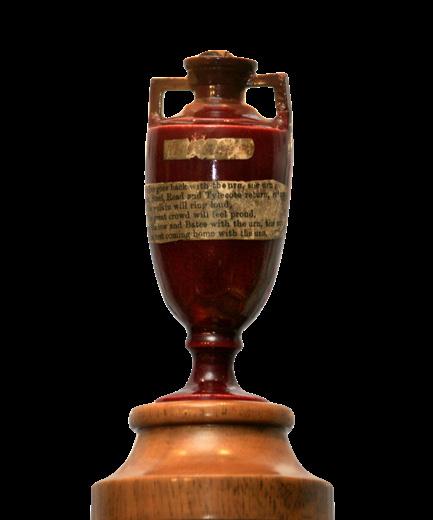
2012
Andy Wagner receives the Sky Sports ECB Coach of the Year award.
2019
Andrew Strauss knighted for his services to cricket and to charity.
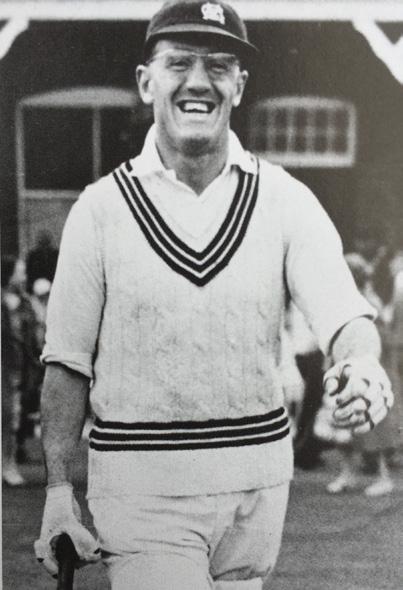
1968
Dennis Silk, Cricket Blue and member of the MCC, is appointed Warden of Radley.
1990s & 2000s
2008
Andrew Strauss (1990, B) appointed Captain of England.
A number of ORs go on to have careers in first class cricket, notably Robin Martin-Jenkins (1989, B), Ben Hutton (1990, B) and Nick Gubbins (2007, B).
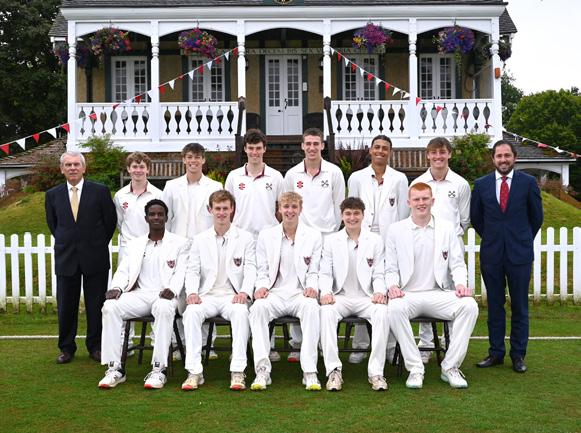
Andy Wagner retires –completing 97 years of Radley cricket coaching by three outstanding individuals.
Bert Robinson retires from full-time coaching. Andy Wagner (Wags) appointed Head Coach, taken from the indoor school at Lords. Wags and Bert work alongside each other for many years. 1985
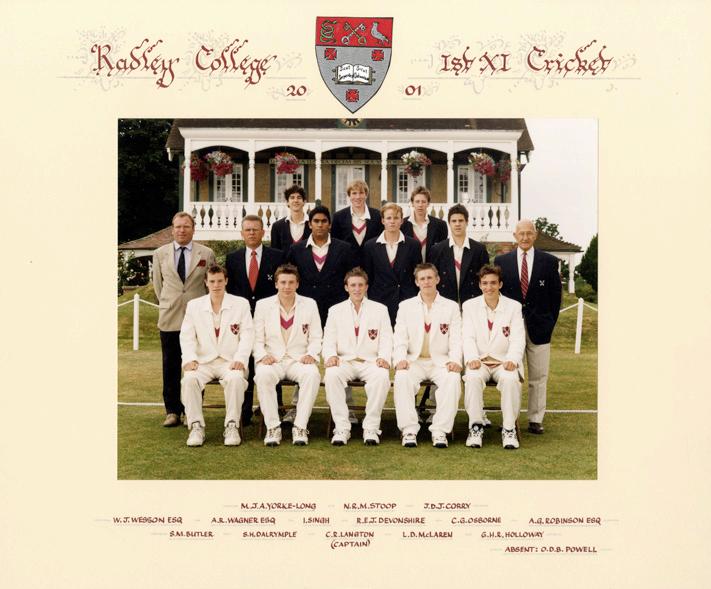
The quality of cricketers that have sprung from their partnership is proud testimony to their ability to encourage and polish the potential of their players.
John Beasley, former Master-in-Charge of Cricket
Michael
Les Misérables
We are delighted that November’s College Musical has been nominated for Best Musical at the National School Theatre Awards, with a number of cast members up for individual commendations. Hamish (6.2, F) shares his review of the sell-out production.
We all knew that, with Miss Buse and Mr Gladstone directing this year’s College Musical, it was going to be a great show, but I don’t think anyone was expecting just how amazing it would be. Based on Victor Hugo’s epic novel, Les Misérables discusses the themes of social injustice, morality and
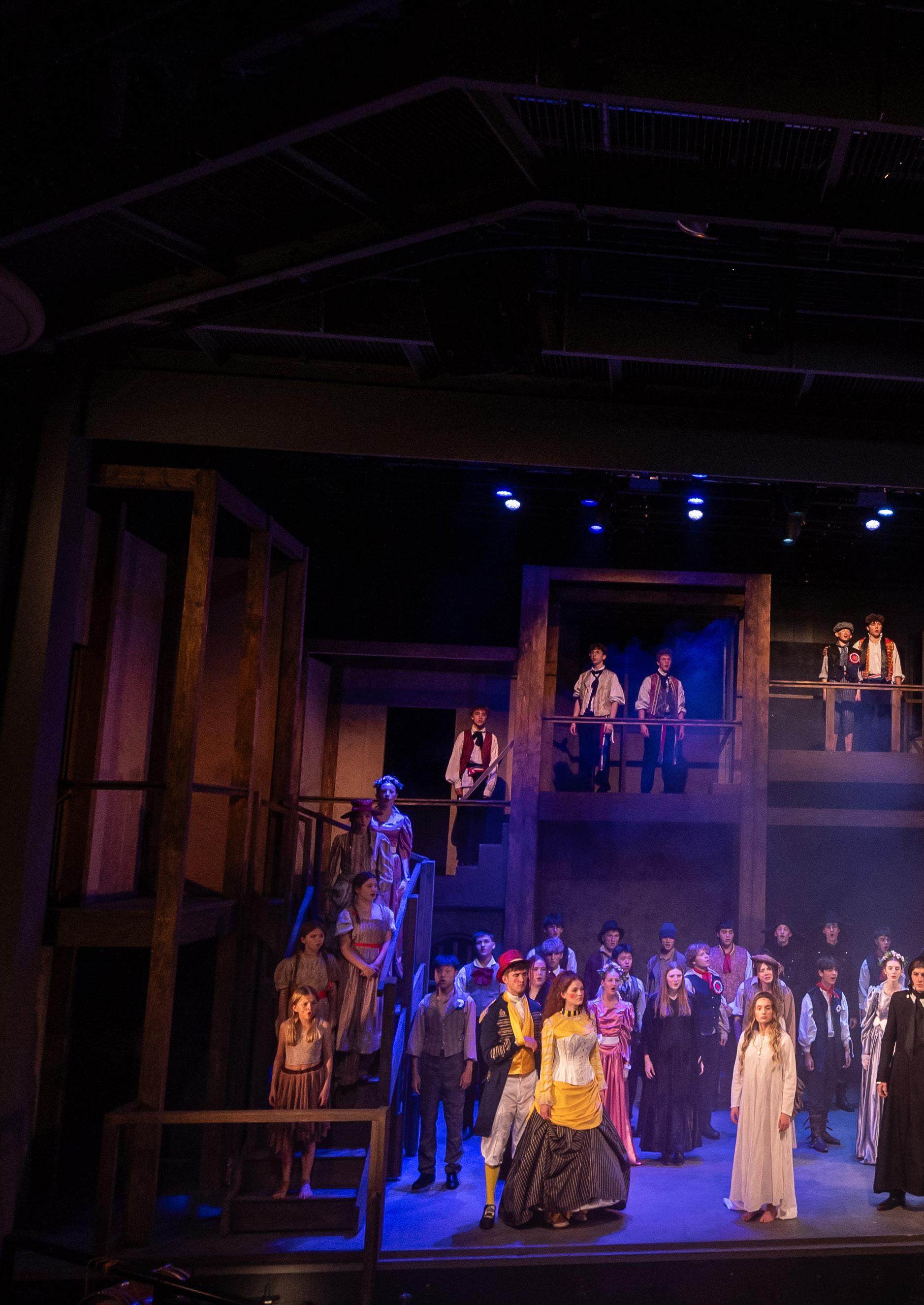
poverty through the creation of characters existing in revolutionary 19th Century France. With a cast of over 60 (made up of Radley boys and girls from local schools), coupled with a brilliant band and slick backstage crew, it truly was a spectacle to behold, thoroughly deserving all four of its sold-out performances.
The technical team, led by production manager Matt Barker, along with the crew led by set-maker Jon Goodall, made it feel as if we were witnessing the revolution ourselves as the iconic barricades were trucked onstage, French muskets perfectly cued by lighting whilst gunshots boomed overhead (I overheard an audience member

say it was “like something from the West End!”). Anyone who has ever been to a Radley production will also know that the costumes and makeup are always exceptional, and thanks to having Lianne Oakley-Rowland as costume designer, this time it was no different.
Every character had their own distinct look, whether it was the hilariously over-the-top yellow costumes of the Thénardiers or the dramatic black overcoat and silky black ponytail of Javert.

However, for all the poetic power of the staging, most of the audience were there for the songs, and there was not a note missed all night; Mr Gladstone and Miss Buse certainly worked their magic, it was as if every single character was written for the
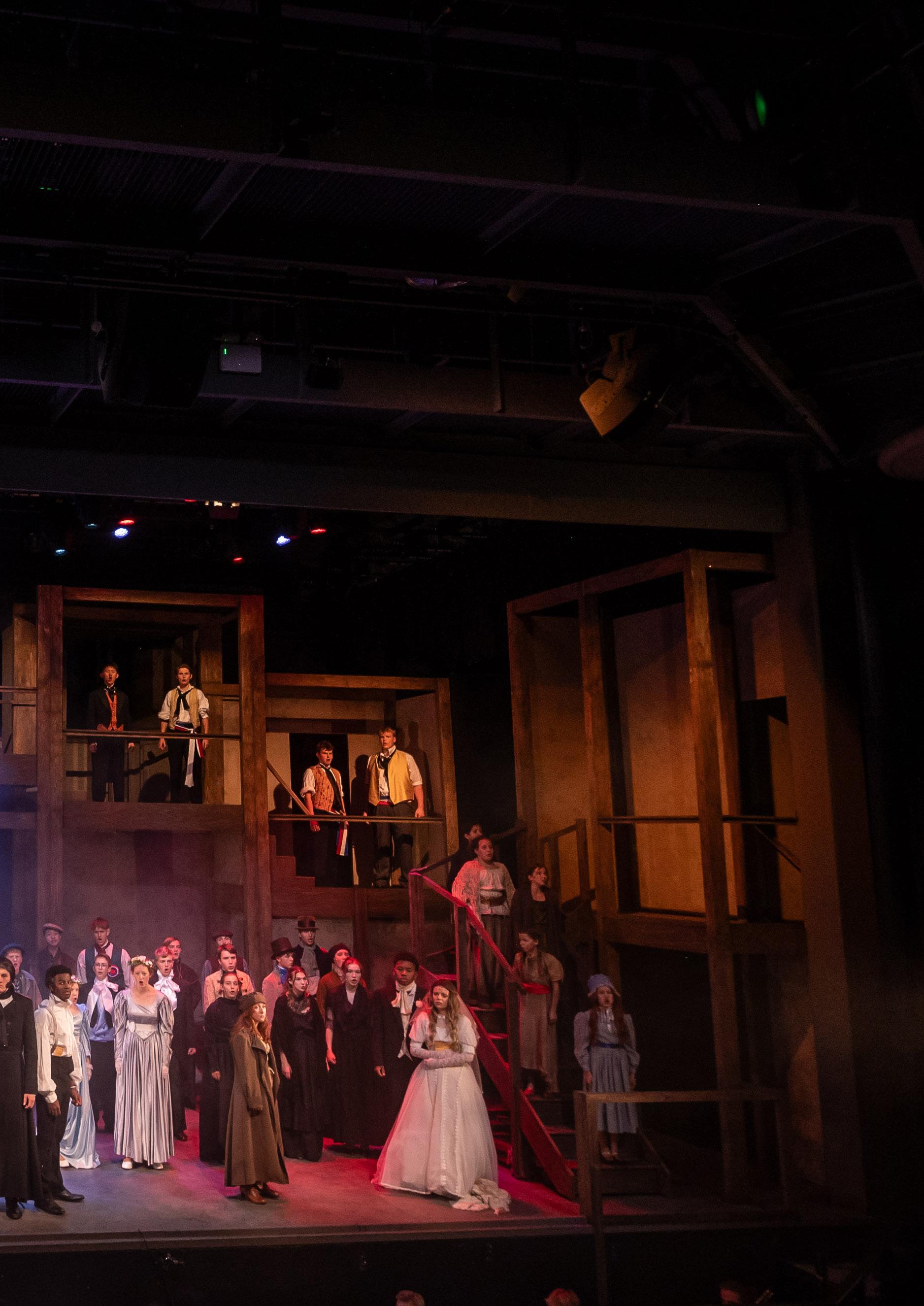
actor playing the part. Stars was sung so well by Angus (6.2, E) as Javert, and Jovan’s (6.1, J) standout performance of Bring Him Home as Valjean caused the already tense theatre to hold their breath. Max (6.1, G) played a powerful and emotional Marius who we see fall helplessly in love with Cosette, played beautifully by Aurabella. Together they performed the moving duet, A Heart Full of Love, which was made even stronger by having the band accompany from the pit.
As a 6.2 boy who has proudly been to most (if not all!) Radley productions throughout my time here, I can honestly say that this was the best show that I have seen. I know that all involved put in a huge amount of work and effort to make sure this performance went as well as it did, and I want to extend a huge congratulations to everyone.
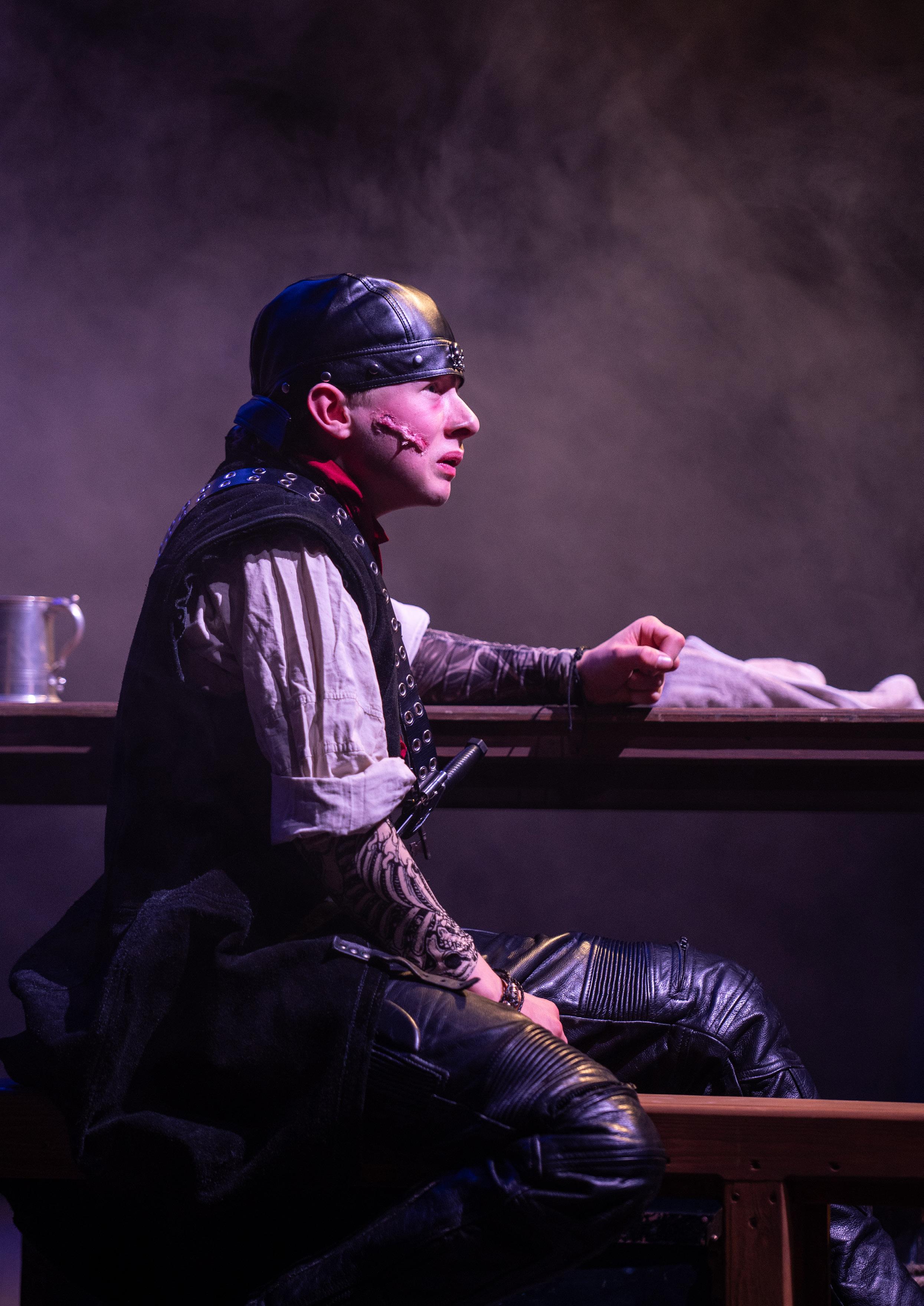
Treasure Island
This year’s Remove Play was a theatre adaptation of Robert Louis Stevenson’s thrilling novel, Treasure Island. It follows the character Jim Hawkins, who discovers a treasure map and embarks on a dangerous sea voyage to find buried treasure. He shares a boat with officials and cunning pirates, including the notorious Long John Silver. The production expertly captured the thrilling battles and tensions of the contrasting characters that made Stevenson’s novel an all-time classic.
As I watched the production, I was enthralled by the stellar performances from all the cast members as they acted incredibly professionally and seemed very comfortable as a collaborative unit. Similarly, I was pleasantly surprised by the expert pirate accents on display! In particular, Long John Silver, played by Olly (R, F), amazed me with his composed and thoughtful vocal inflections that had the ability to grasp the attention of the entire
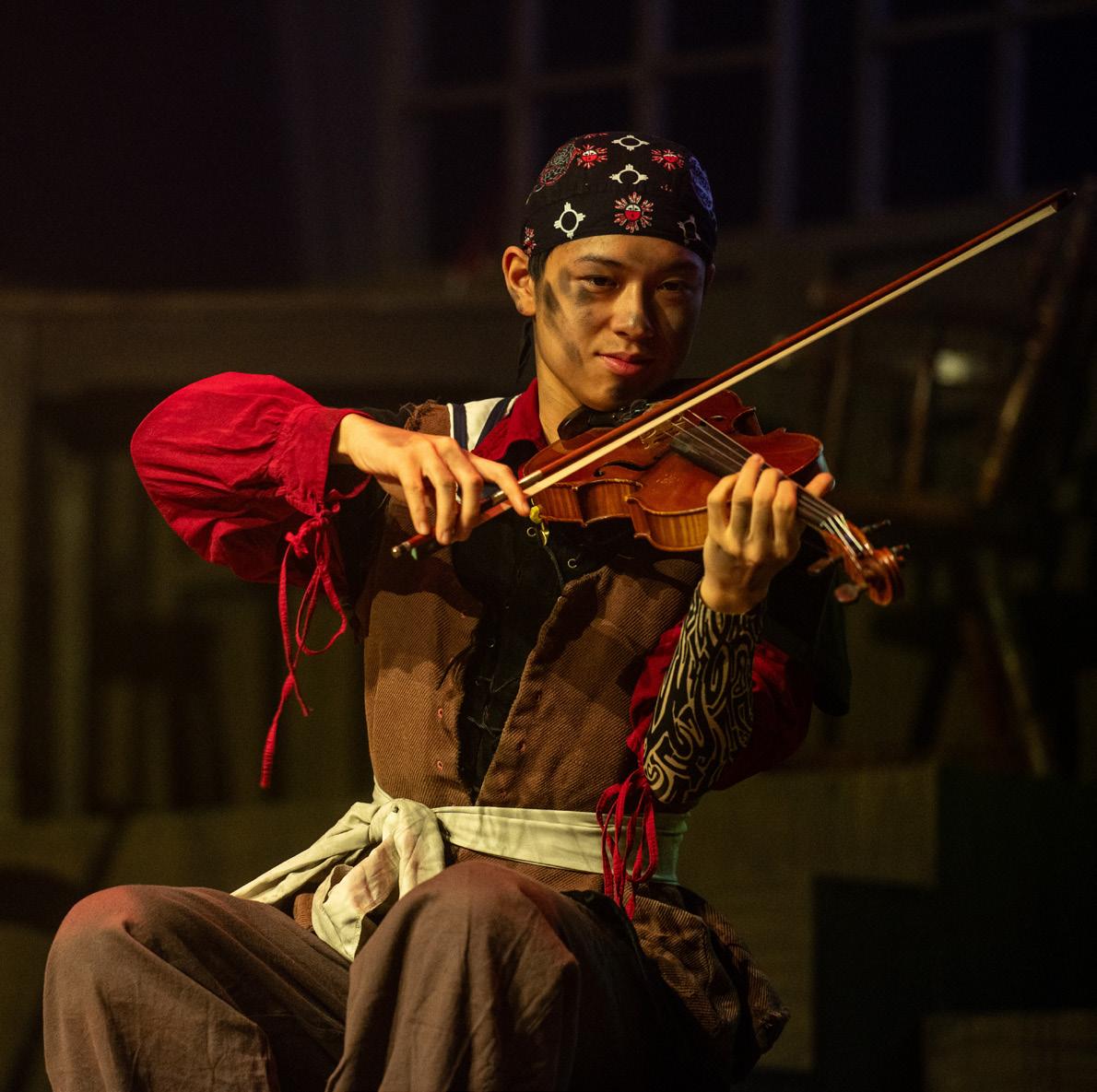
audience. Despite his limp, he was able to move in a manner that commanded his fellow pirates and established him as a stoic and seasoned leader.
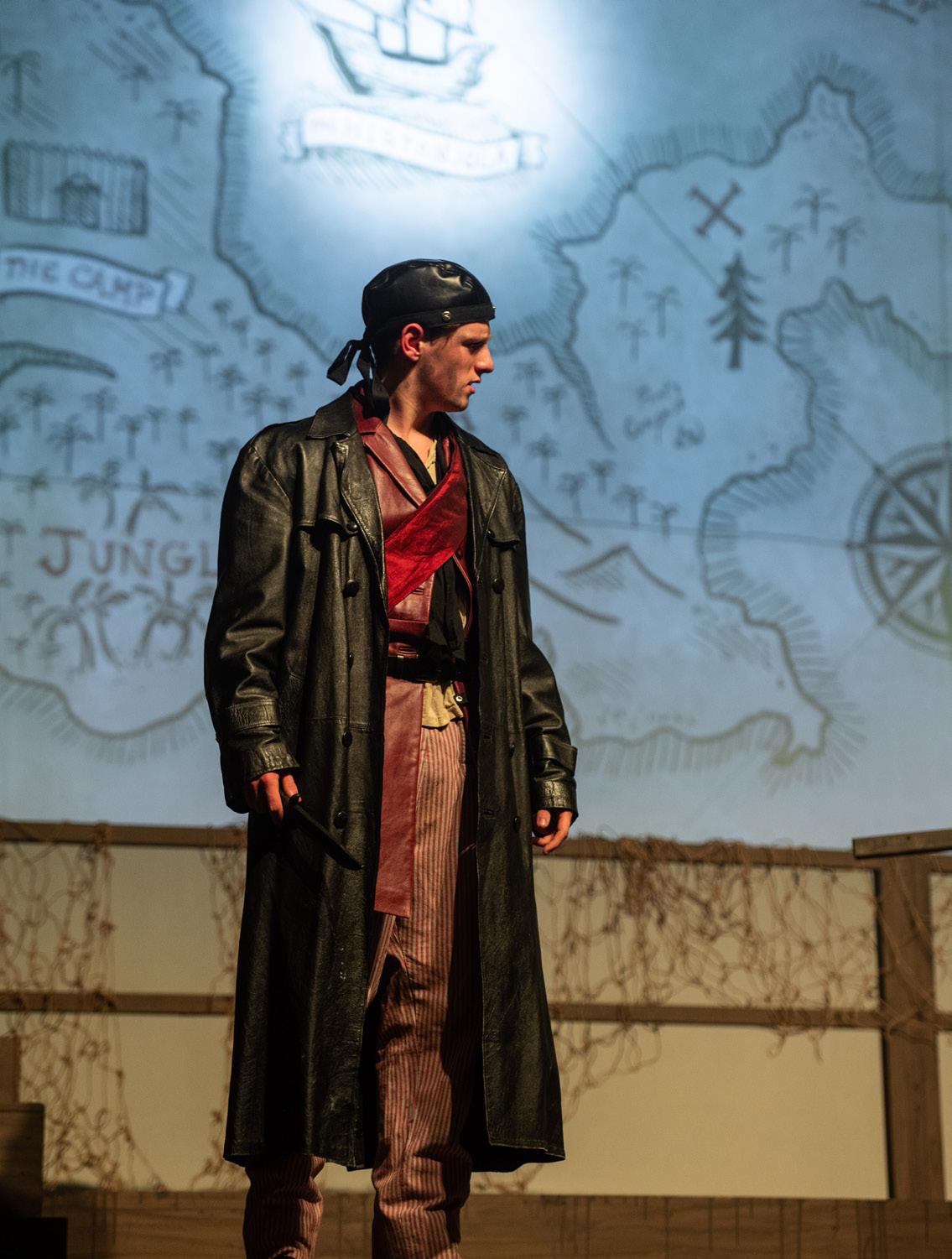
The central protagonist, Jim Hawkins, was played by Archie (R, G) who flawlessly executed his gradual character development. His stance, vocal choices, and overall demeanour allowed him to shift from a timid young assistant to a bold treasure-finding hero at the end of the play. Other stand-out performances were Will’s (R, F) antagonistic and frightening portrayal of Israel Hands, and Ned’s (R, A) passionate and energetic opening to the play as elder pirate Billy Bones.
Overall, the production was a great directorial success for Amber Burton and Serena Eggers, the latter’s first endeavour into Radley Drama. The production was supported by exquisite costume design and a pirate ship set, both of which helped immerse the audience into the hearty life of the seven seas.
George (6.1, B)
Progress Report
Jonathan Porter has had an interesting career path. Having been a founding member of Michaela Community School, and rising to the role of Deputy Head, he then took time out of the classroom to complete a Master’s degree before being appointed as Radley’s Deputy Head (Academic). Now midway through his second year at Radley, his expectations are high – for teaching, for learning, and for the academic culture of the College as a whole. Here, he explains his philosophy and his reflections on the journey so far . . .
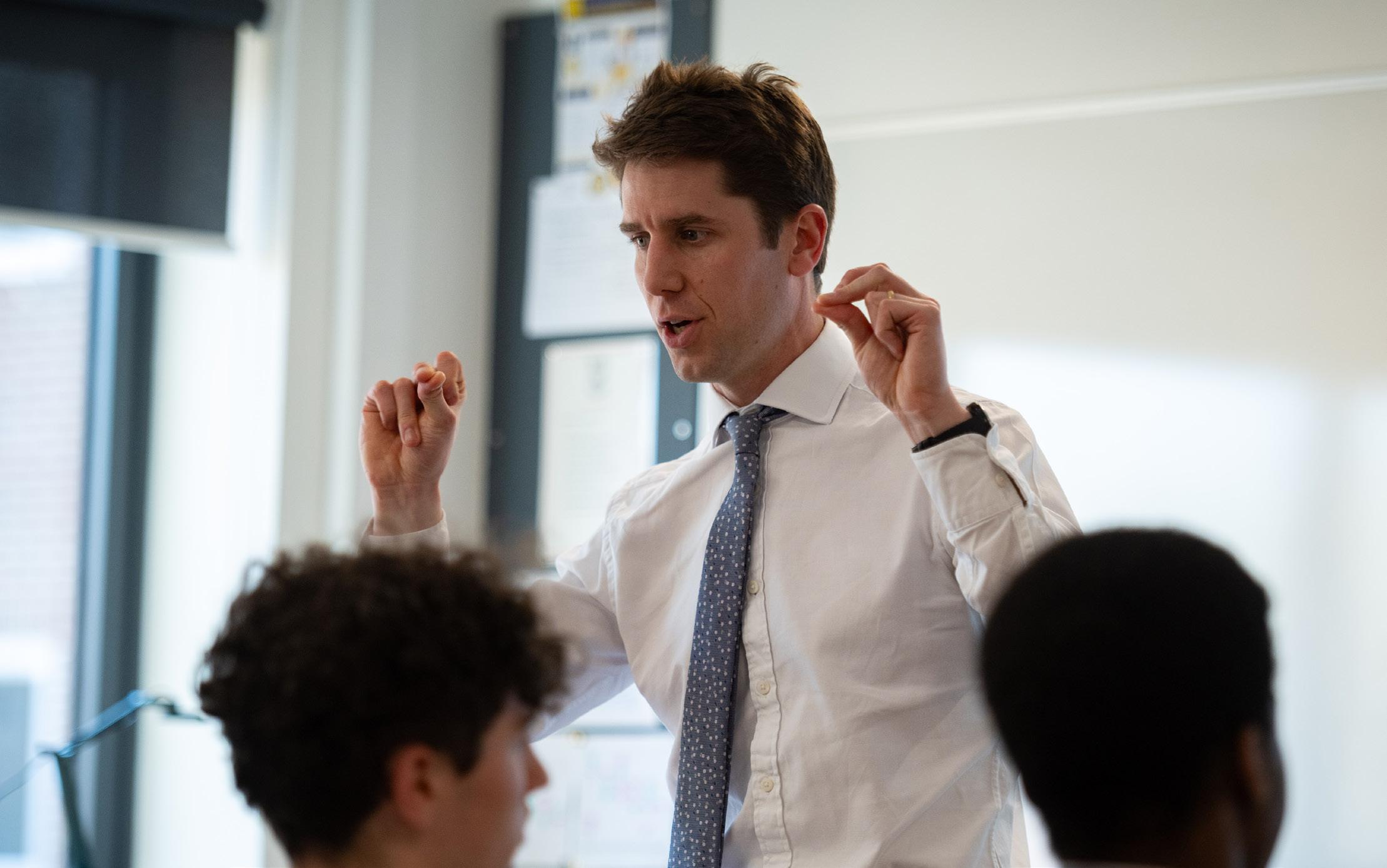
You wrote an article recently in The Spectator in which you reflect on the state of education in England. What is your vision for education at Radley?
I believe in combining high expectations with high support. Some schools have high expectations but provide low support. They say that they expect pupils to work harder and to complete work of a higher quality but the level of support
they provide is limited. If the pupils don’t succeed, they’re told they didn’t work hard enough or they’re just not capable.
Of course, sometimes pupils do need to work harder. By definition, an A* is out of reach for some pupils through no fault of their own. But it’s also true that we should ask ourselves whether we’ve done what we can to support a pupil to achieve the highest standards. Have we broken down or ‘chunked’ the content so
it’s taught in digestible bites? Have we thought carefully about our language so we explain difficult concepts in the simplest possible terms? Have we checked that everyone in the class really understands the topic before moving on?
I believe that the best schools are so good they can take pupils of varying abilities, and they can set high expectations for all. They combine those high expectations with high support to maximise pupils’ academic progress, regardless of their varied starting points.
I should say that this is true for teachers, too. Senior leaders often have high expectations but they don’t always support their staff to become better at their jobs. I’m as interested in supporting dons to become even better teachers as I am interested in supporting boys to become even better learners.
I believe in combining high expectations with high support. “ “
So how has your vision influenced the changes you’ve made so far?
A good example might be supervised study, which we brought in last year. For large parts of the day, Sixth Formers have independent study periods (which the boys, mistakenly, once referred to as ‘free’ periods!). When I arrived at the College I noticed that the quality of that study time was not as high as it could be. My response was to support boys to be able to study better in those periods –particularly those who struggle more with self-regulation and self-motivation. Some boys are fortunate enough that their level of independent self-discipline is very high by the age of 16 or 17, but there are many others who need support to help them make good academic decisions.
An example for dons might be our new custom of ‘drop-ins.’ Often, school leaders expect their teachers to continue to improve their teaching throughout the course of their career. But quite how this is going to happen is a mystery: they have the expectation of better and better teaching, but the systems to support that journey aren’t there. We introduced ‘dropins’ to create a culture where a don ‘drops-in’ on a colleague for 20 minutes each week to help colleagues ‘magpie’ the best teaching practices from one another. By doing so, we are combining the expectation that dons continue to improve their classroom practice with the structural support to help them achieve that.
Since your appointment in September 2023, you’ve also made changes to rewards and sanctions. Why was that?
I want to try and encourage more recognition for what we might call ‘lower stakes behaviour’. Schools are often very good at giving prizes to pupils who excel in the end-of-year exams. What they are sometimes less good at is rewarding and recognising a pupil who puts more effort in one week than another. That’s so important because, by definition, most pupils can’t win prizes for outstanding performance at the end of the year!
I wanted to boost the culture of distinctiongiving so that more boys got the buzz of receiving praise from time-to-time and then might want to put that little bit more effort in again. We’ve done that by creating a Collegewide lottery so that, each week, one boy who has received a distinction or a postcard has their name pulled out of a hat. That boy then gets invited to a special meal called ‘Distinction Dining’ which happens in Shop every half-term. Not only can the Tutors make great theatre of this but we can also recognise and reward the boys for their effort, as well as their academic excellence.
To make sure we don’t lose the human touch, we’ve boosted the custom of dons giving handwritten postcards.
I remember reading an article in The Times by one of the business columnists, Harry Wallop (1998, B). He wrote a brilliant piece about the importance of recognition and his memory of the ‘Silkogram’ he once received when he was a boy at Radley. Dennis Silk, Warden of Radley (1968-1991), would often write boys postcards to recognise their excellence in various pursuits. If a boy receives a postcard that means that he was that don’s top boy of the week.
And sanctions? Is that too tough?
No don goes into teaching to give a boy a sanction but, unfortunately, they are sometimes necessary to ensure that we prepare the boys for life outside the College. The boys have to know that we want to reward them when they work hard but, as in life, there are consequences for getting it wrong.
When I arrived at the College and went to supervise my first detention, some of the boys couldn’t remember why they were there. The detention was too long and it was too far away from the original infraction, which, in some cases, was two weeks ago. So we replaced the long Sunday evening detention with a short 20-minute detention each morning. We created a table of expectations so the boys knew what was expected of them (for example, telling a don in advance if they were struggling to complete the prep on time). Now, if there are any detentions, they’re done and dusted by 8.30am the next morning. Learning to be prepared for a meeting, giving your boss the work she expects when she’s asked for it ... these are all soft skills that employers
are looking for which we need to instil in boys before they leave us.
We recognise and reward the boys for their effort, as well as their academic excellence.
“
What changes are on the agenda?
Over the summer we will be refurbishing the library. The intention behind this is, first, to give us an even more beautiful library than we have at the moment and, secondly, to give us more supervised study space for Sixth Formers.
I’m also excited about the changes we’re making to Oxbridge preparation. In September, we’re introducing a new Oxbridge Applicants Evening at which boys will present (and take questions on) a topic of their choosing. We think this will encourage them to read widely and diligently over the summer, and give them an opportunity to talk about a subject they’re passionate about before an interview. We’ve also redesigned our Curriculum Extension Programme, which runs parallel to the A-Level, to create a series of specialised courses which will directly support boys undertaking competitive university entrance exams.
When did you become aware that your changes were working?
I had a lovely email from a parent who commented on how much her son was enjoying Sixth Form. She wanted to pass on to me how grateful she was that dons were taking the time to celebrate the extra effort he was making in his subjects.
The next day, I took my Form out for supper and they were telling me about how much they were enjoying their lessons. ‘She just makes it stick, Sir’ and ‘He’s so enthusiastic, Sir’ they said about a couple of dons. Those kinds of comments are very special.
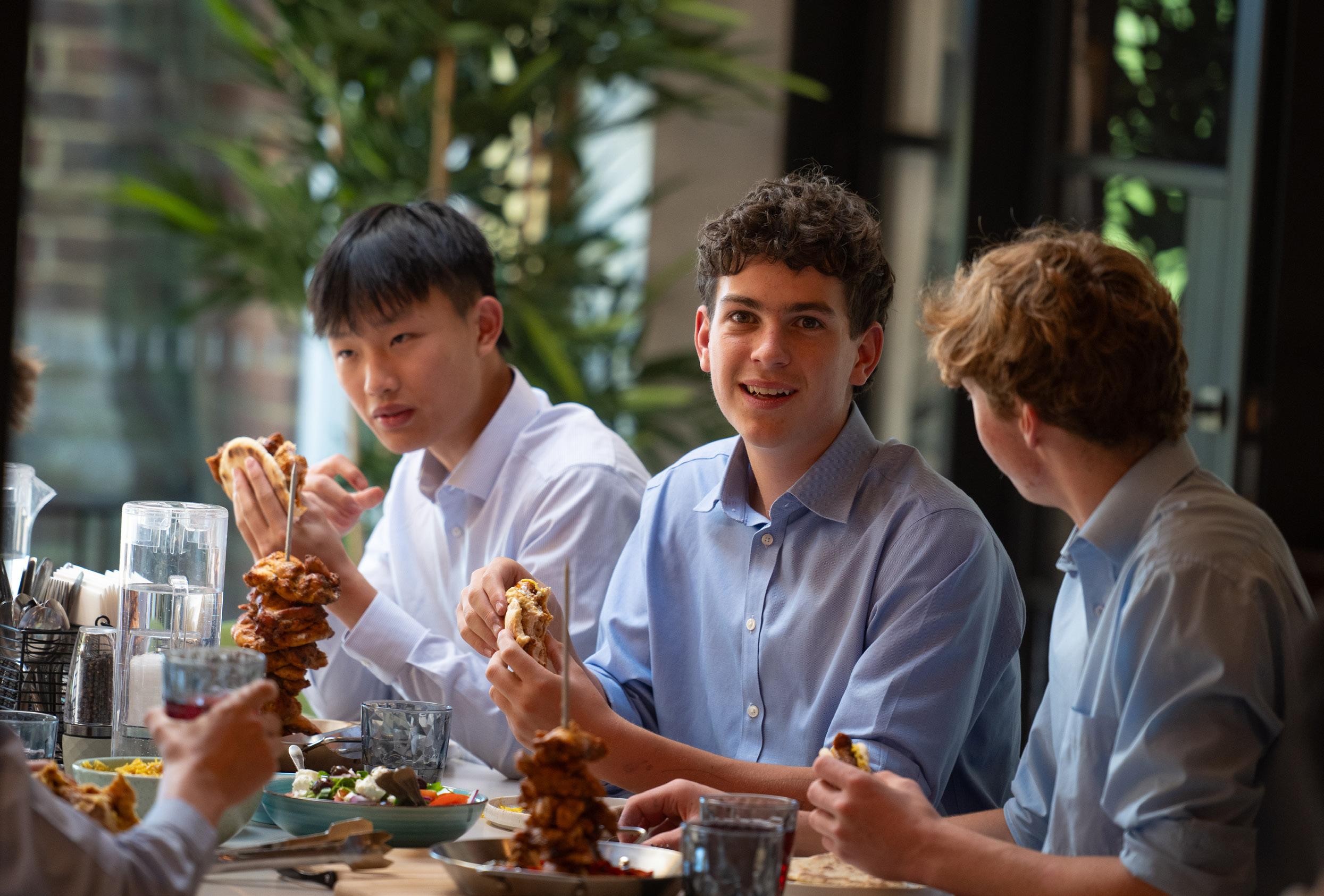
Food For Thought
The Sub-Warden’s Advisory Committee (SWAC) is a boy-led committee chaired by the Sub-Warden, with the aim of listening to recommendations from the boys. Some of the more recent areas of discussion have included the renovation of the golf practice nets, reinstating the InterSocial Touch Rugby tournament in the Michaelmas Term and the introduction of Shop Lunch, all of which have been acted upon. Membership of SWAC is comprised of one 6.2 boy per Social (often Deputy Heads of Social). Each Social has a smaller committee chaired by the Tutor, and a representative from each year group will put forward ideas that are then passed upwards to SWAC.
Besides various College issues, the other main feature of SWAC is to critique food and catering. Most boys are very opinionated about what they do and don’t like, and SWAC acts as a direct line to the Catering team. Pam Dickens, Head of Catering, is a member of the committee and boys’ recommendations are taken into account to the best of the Catering team’s ability (while working to budget, and mindful of staffing constraints). A notable recent example has been improvements made to the popular ‘Burger Night’, otherwise known as Wednesday night supper.
A recent College innovation is Shop Lunch. This takes place once every couple of weeks, with Socials on a rota for a special lunch in the newly renovated Shop. These lunches have ranged from tomahawk steaks to Indian and Chinese street food. Shop Lunch is a great chance for boys to try different cuisines, mix across year groups and chat with dons and staff associated with the Social. It is safe to say that Shop Lunch has been a great success all round.
The Racketeers
The 800 acres comprising Radley College accommodate a myriad of sporting possibilities for both students and staff, from cricket to croquet to cross-country. A lay-person may be puzzled by this line-up’s inclusion of rackets, an obscure ancestor of squash originally conceived and pursued by the yardbirds of Georgian debtors’ prisons (‘Not to be confused with racquetball’ offers Wikipedia earnestly, referencing the separate American invention). Yet rackets has been a source of competitive ambition for Radley boys since 1887 – an historical pedigree reflected in the rackets court’s central campus position (adjacent to Coffee Shop). Over a century on from its esoteric inception, the sport is seeing present-day success at the College, complete with a new generation of national trophy contenders.
Joining Common Room in 2016, the teaching techniques of coach James ‘Rocky’ Rock are most obviously informed by his half-decade stint at the Montreal Rackets Club: “I like to think that we’re a club and we’re a team, and that’s a sort of culture that I want to breed. We win together and lose together,” he says when I meet him for a Short Break interview. That said, an even greater asset from Rocky’s background is likely the correlation between his own boarding school education and those of his Radleian charges, and the insight this has subsequently elicited. “I went to Cheltenham College – when I arrived
as a Shell, I’d never seen or played rackets. I sort of realized that I was getting drawn to the rackets court a lot, even if it wasn’t to play. I was going to sit there and just have a chat. It was a safe-haven within my school life, where I could go and just feel a bit at ease – you know, to get rid of the stresses of work.”
Indeed, the tournaments James Rock once took on as a boarding-school teenager are the very same now conquered by the students he coaches. The Queen’s Court in West Kensington (home to rackets during the 1908 London Olympics) hosts the National Schools’ Championships –the Peter Grey U15 doubles were won by Rock and partner Nick James in 2003, and by Radleians Laszlo (R, C) and Evy (V, C) in 2024. While Rocky has reached the finals for the Foster and Jim Dear U15 Cup titles, his coaching and support has pushed Magnus Garson (2017, C) and the aforementioned Laszlo to outright victories in these respective categories – the latter for two years running.
“I’ve always liked rackets because you don’t know what you’re going to get,” comments Laszlo, when I ask what drew him to the little-known sport in the first place. “It’s quite scary in a fun way, and it’s very easy to tell when you’re getting better. It’s very satisfying in that sense . . . We have a lot of fun.” As with his mentor, the Remove also appreciates the therapeutic appeal of his chosen hobby. “It’s nice to just go to the court . . . You’re having a bit of a long day, and you want to chill somewhere – you go there, talk to someone you like and hit a ball . . . ”
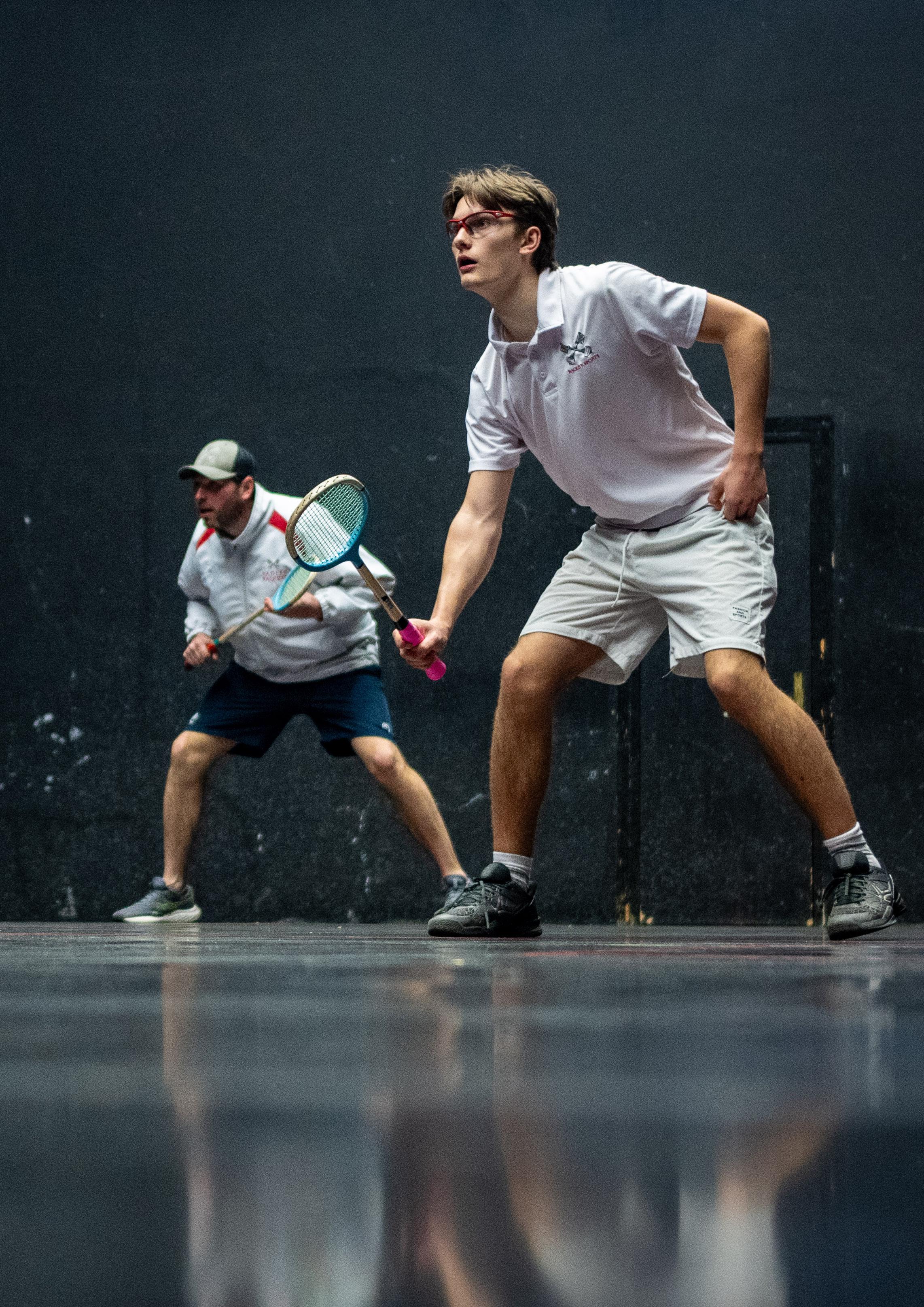
Rackets is known for its difficulty and speed – Laszlo describes the sport as “very ‘hyper-action”, while James Rock notes that “rackets is so fast I felt that when I played other sports, I had a lot of time!” – and the ball can be hard enough to inflict significant injury. Week-long tournaments at Queen’s Court can thus be intense affairs, especially when (as was Laszlo’s experience last year) they must be balanced with the tireless schedule of a Radleian Michaelmas final week. Nonetheless, he emphasises that he wouldn’t turn down such unique opportunities – “we’re lucky to have a sport that takes us there.”
What’s next? Laszlo has few doubts. “I want to keep playing. I want to keep getting better. My next target is the doubles at the end of this term. I want to keep going, keep changing how I play and keep getting better at that, keep getting to know my partner, keep
having a good time, keep smiling on court.” Shortly after our interview, he and Nathan (6.1, L) won the Pairs Final of the 2025 National Schools’ Doubles Championships (the first time Radley has claimed the title since 1982, with Lazlo the youngest player to ever do so). One onlooker described their play as being like “the most amazing ballerina/bullfighter who fended off a machine gun battery of adversary strokes as though swatting flies for fun . . . Utter magic on court!”
For Rocky, coaching the next generation remains the priority – not only guiding Laszlo and colleagues to new heights, but making room for new players that would otherwise not know of (let alone participate in) this strange, yet time-honoured, sport. “Hopefully, they enjoy the experience! I think that’s the most important thing. National tournament victories are great, but making sure the boys have a good experience – and become good well rounded human beings – is the priority to me.”
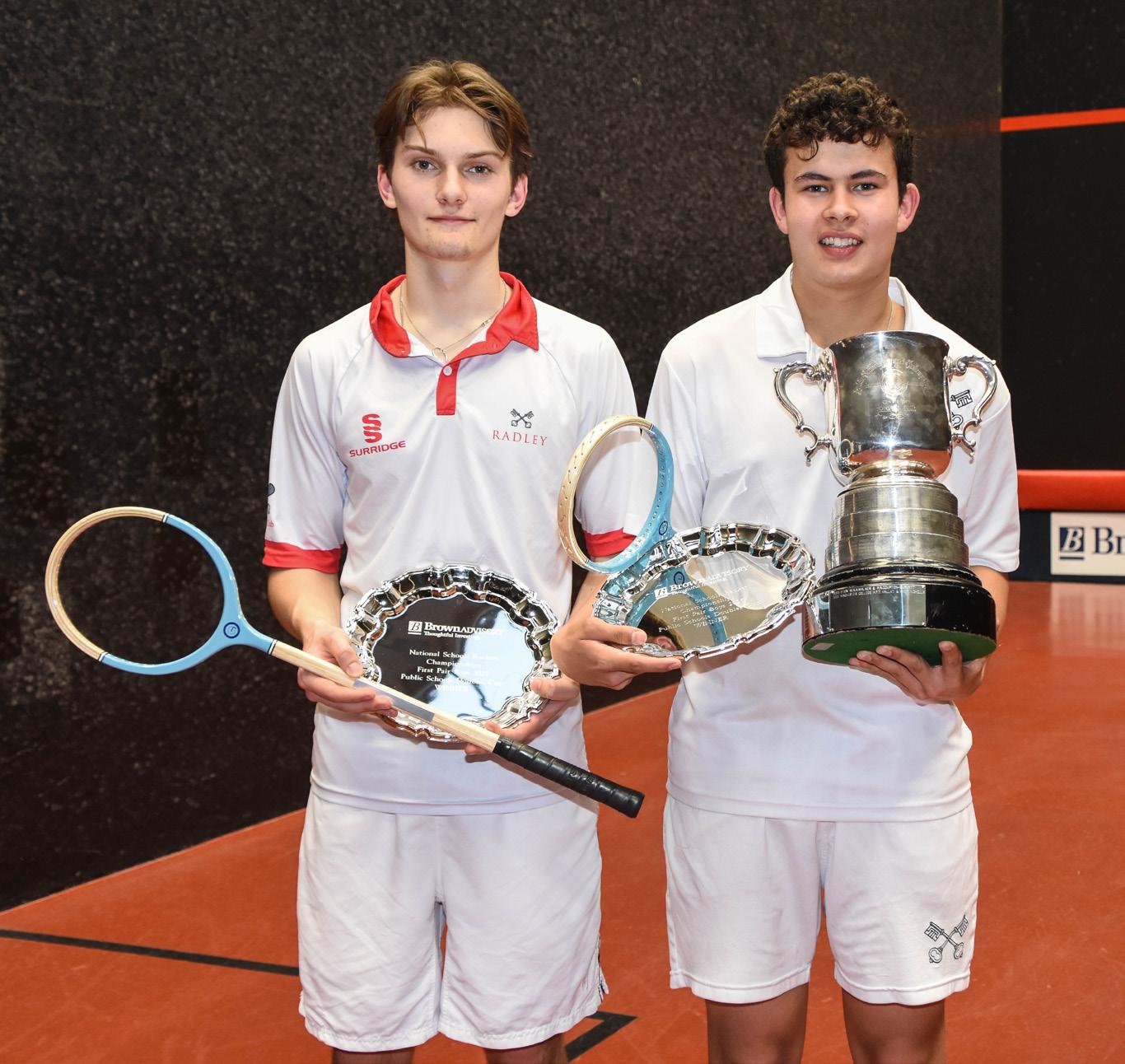
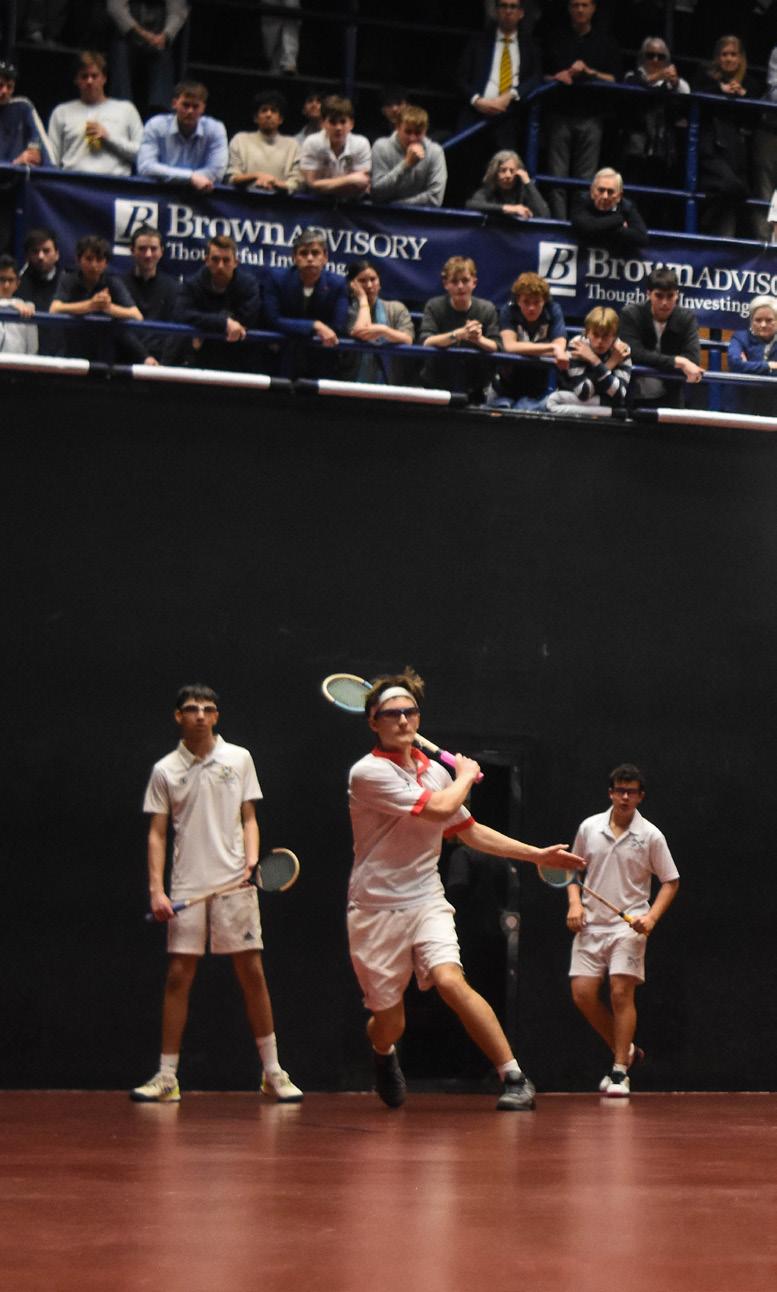
Picture Credit: Tim Edwards
‘Interesting ... Very Interesting!’
An interview with Barry Davies MBE
Sometimes the most important step is the first one, especially when it comes to considering your future career. Since early childhood, Tristan (V, J) has known that he wanted to work in football – not necessarily as a player of the beautiful game, but rather as an agent or commentator. His passion for commentary even extended to Radley’s Declamations competition this year, for which Tristan ‘declaimed’ commentary from the 2024 World Cup final.
Wanting to establish some groundwork for his long-term goals, Tristan sat down to interview a legend of sports commentary, Barry Davies MBE. Across a halfcentury body of work, Barry commentated on 10 World Cups (including the 1994 final), seven European Championships, 12 Champions League finals, 12 Summer Olympics, the Oxford-Cambridge boat race (between 1993 and 2004) and the BBC’s Match of the Day (between 1969 and 2004), along with illustrious stints in the worlds of hockey, cycling, tennis and more. The following is Tristan’s transcription of his chat with Barry – the beginning of the former’s career being sparked by a retrospective of the latter’s.
Tristan: Why did you go into sports commentary?
Barry: I wanted to be a doctor. I didn’t work hard enough, and I was ready to go into dentistry, although I hated it. I was called up to do National Service, and so I joined the army and was posted to Germany where I got involved with sport. As a secondary job at my company, I started to take over the organisation of matches with other units. That led me to being asked by British Forces Broadcasting to come and chat to them on their Sunday programme on the radio. I thought ‘Let’s see how it works out’. Well, it did work out, and I eventually did my first football commentary . . . the rest is history!
What has surprised you most about the world of sports commentary?
I was just lucky all the time. I had a commanding officer who said to me ‘We’d like you to stay, but we understand you want to give this broadcasting game a go’. Then he told me, ‘If you make up your mind that it doesn’t work and you want to come back, I’ll fix it . . . But if you don’t go and try, every time you’ll look at that fellow David Coleman [BBC sports commentator] and say, ‘I could have been like that’.’
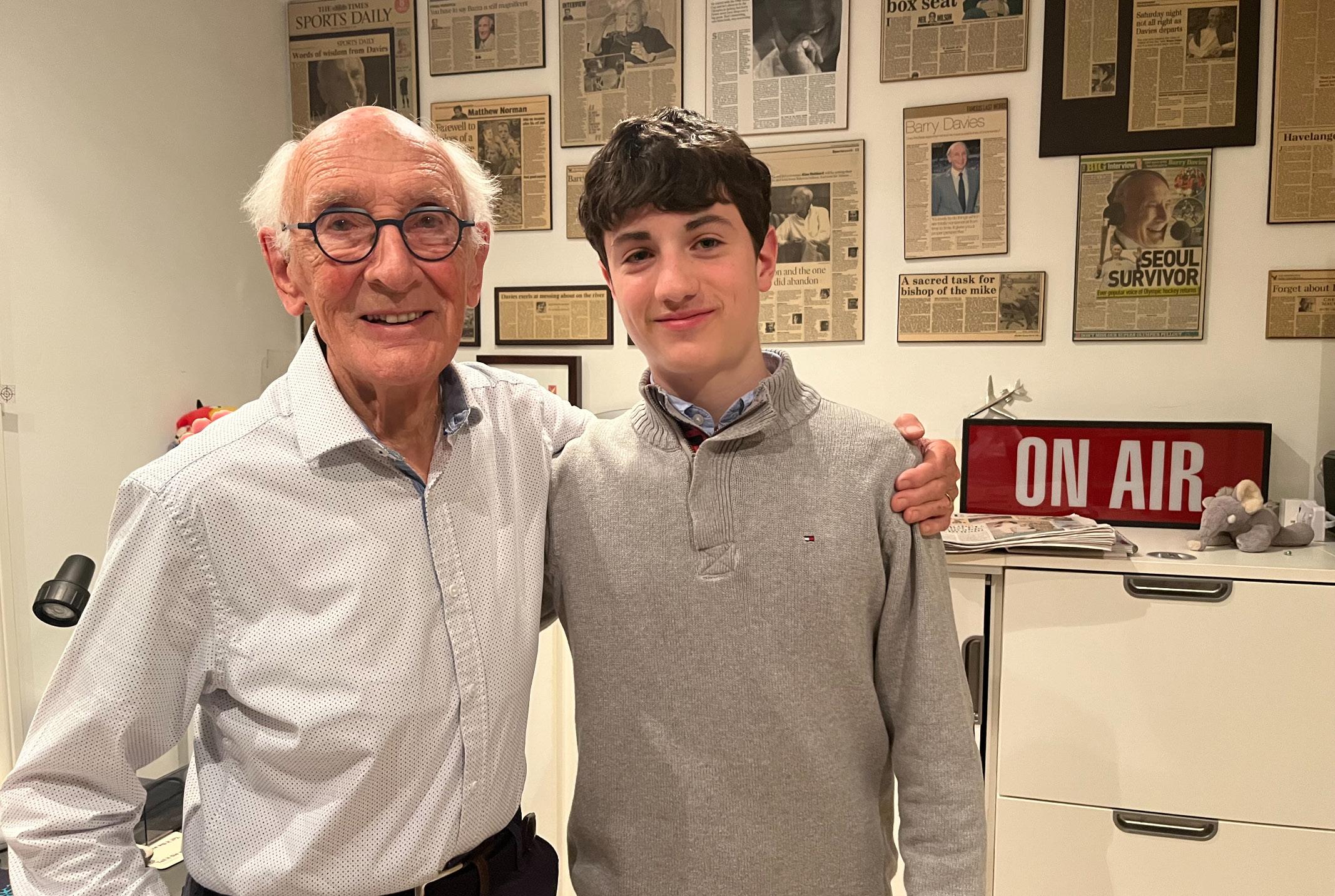
Who would you say is your favourite footballer of all time?
It’s a fellow called Jimmy Greaves. He was a brilliant, brilliant player for Tottenham Hotspur, which was my team. I just think he was the best because he was a ‘goal out of nothing’ player.
Who do you think is better between Messi and Ronaldo, and why?
That’s a difficult one, but Lionel Messi is not as conscious of his own self. They were both brilliant players and it is an honour to be able to commentate on players of that quality. I commentated on Ronaldo more than Messi because he was in the Premier League – I saw Ronaldo’s first international appearance at Euro 2004, which was my last major tournament. He came on as a substitute in the opening game against Greece, and he did alter the game a bit, but they still lost. I thought the coach wouldn’t pick him for the next match and I was totally wrong . . . he helped Portugal get to the final!
Do you think England could win the World Cup in 2026?
Well, they’ve made a good move in bringing in [new manager] Thomas Tuchel. I think Southgate will think, ‘If only I had let the leads go a little bit’, because he was a good coach, reaching two finals. [But] in the first semi-final at the Euros at Wembley, when they got the lead, he held them back. I liked him, and I think he was a very good coach –let’s hope the new guy will take a chance!
Who do you think will win the Premier League this season?
Liverpool is running away with it at the moment. Manchester City’s five losses in a row in all competitions aren’t looking good. I watched the 4-0 victory over Manchester City from Tottenham Hotspur and thoroughly enjoyed it. The second goal James Maddison scored . . . the little flick with the left foot . . . he’s a very, very good player.
If you had been a footballer, what position do you think you would have played?
On the right wing. I was very quick at school despite being too one-footed to be a good player. But I managed to get my son to play with both feet and I made sure he practised. He still plays football every Wednesday, a good little player!
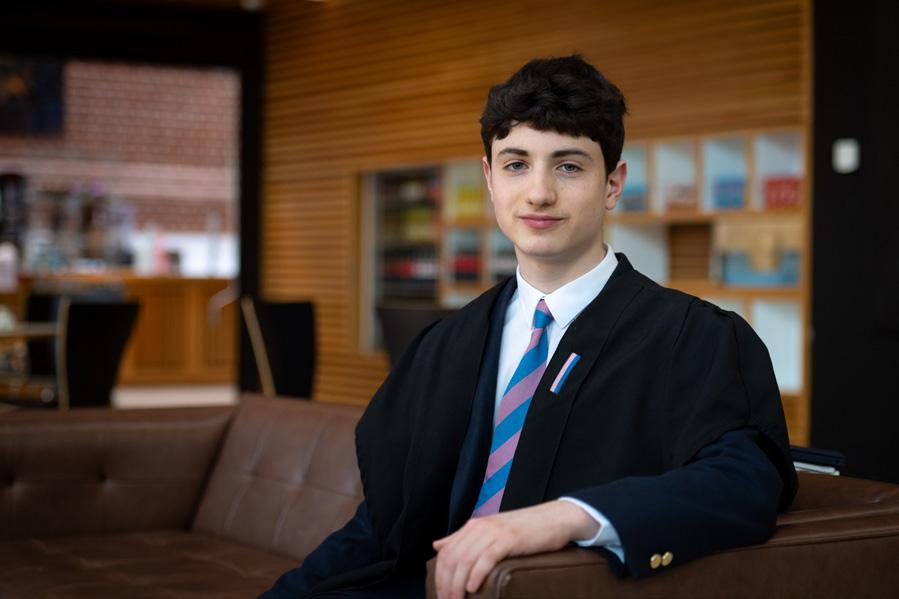
What qualities do you think a football commentator needs to succeed?
To inform the viewer; to give his opinion from time to time . . . but not constantly; to be aware that the viewer has an opinion.
And switching over to rowing, whose job is harder, oarsman or cox?
The cox goes into every event knowing one mistake could cost the whole boat. Obviously, if one of the oarsmen makes a mistake with a stroke, that could also ruin the chance . . . I really enjoyed doing the Boat Race. Before 1993, 16 of the previous 17 had been won by Oxford. In 2003, the Boat Race was won by one foot!
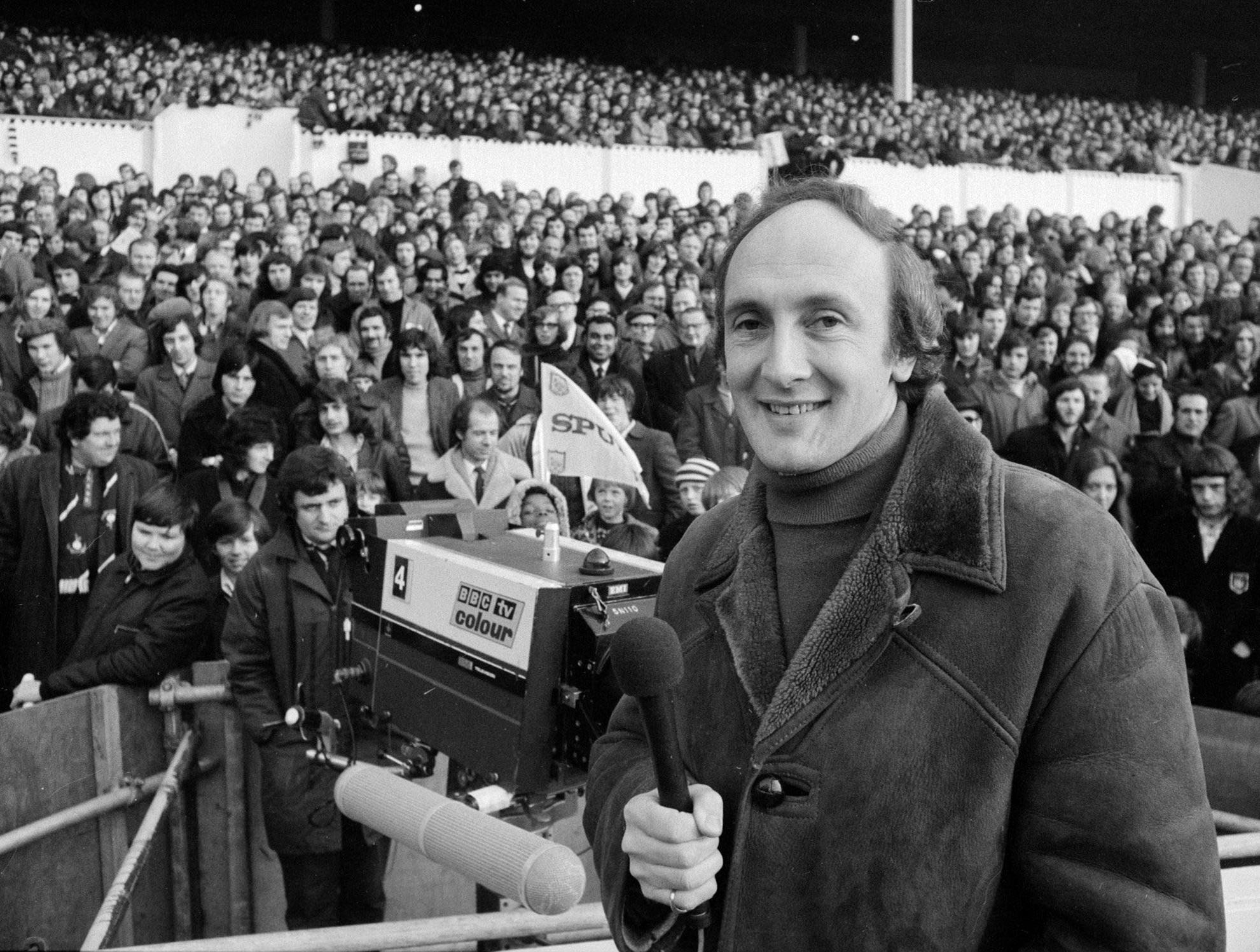
Talking Heads
Radley’s
Parent Webinar Series
The plan is that we will host two of these a term, to look at some of the issues, challenges and pressures around modern parenting today,” related Sophie Langdale, Director of Admissions and Communications, in the opening minutes of Radley’s inaugural Talking Heads webinar. “We hope this forum will spark conversation but also give you some reassurance.”
After nearly two years, the lecture series has covered everything from Andrew Tate and adolescent anxiety, to pounds, pence and parties, to teenage testosterone and tobacco – an impressive spread of topics from what modestly began as a response to the feedback of a 2021 College Communication survey. Sophie explained the thinking behind Talking Heads further at that first presentation: “There was an overwhelming number of parents who said they would like guidance, specifically on social media, drugs, sex and relationship education, and alcohol. . . these challenges are always evolving for us, and we’ll do our best to be nimble and dynamic in response to these shifting environments.”
Addressing the fickle swing of the modern youth culture landscape has necessitated a speaker line-up of the highest calibre. Chloe Combi, who fronted the second ever Talking Heads webinar ‘Trends in the Teen World’, is a globally renowned scholar of teenage life, host of the #1 Apple podcast You Don’t Know Me and the critically acclaimed author of the book Generation Z: Their Voices, Their Lives
Other talents on the bill have included health science communicator Dr Xand van Tulleken, a regular on BBC Morning Live who also appeared in the Royal Institution’s 2024 Christmas Lecture last year, and Dr Maryhan Baker, whose How Not to Screw Up Your Kids has been named by The Guardian as one of the top five parenting podcasts. Radley’s own staff have also headlined from time to time, with the Warden John Moule leading webinars on educating boys and digital policy, and Dr van Tulleken’s stint structured around a conversation with Head Nurse and former colleague, Alex Gilley.
Therein lies an essential balance between broad expertise and the specific knowhow of the College environment’s idiosyncrasies and eccentricities, which allows Talking Heads to be integrated neatly within the boys’ own PSHE and RSE provision. The webinar series is also aligned with events in the school calendar – indeed, a recent edition was William Wadsworth’s guide to revision, scheduled just in time for exam season. “I remember, bless him, little old me after GCSEs, sitting down and writing about how to take exams . . . ten years later, that became my first book,” the memory psychologist recounted to Deputy Head (Academic) Jonathan Porter and the audience of nearly eighty families.
Though the medium of Microsoft Teams risks a feeling of detachment between a lecturer and their audience, this thankfully has not been apparent with Talking Heads. Parents have been vocal about


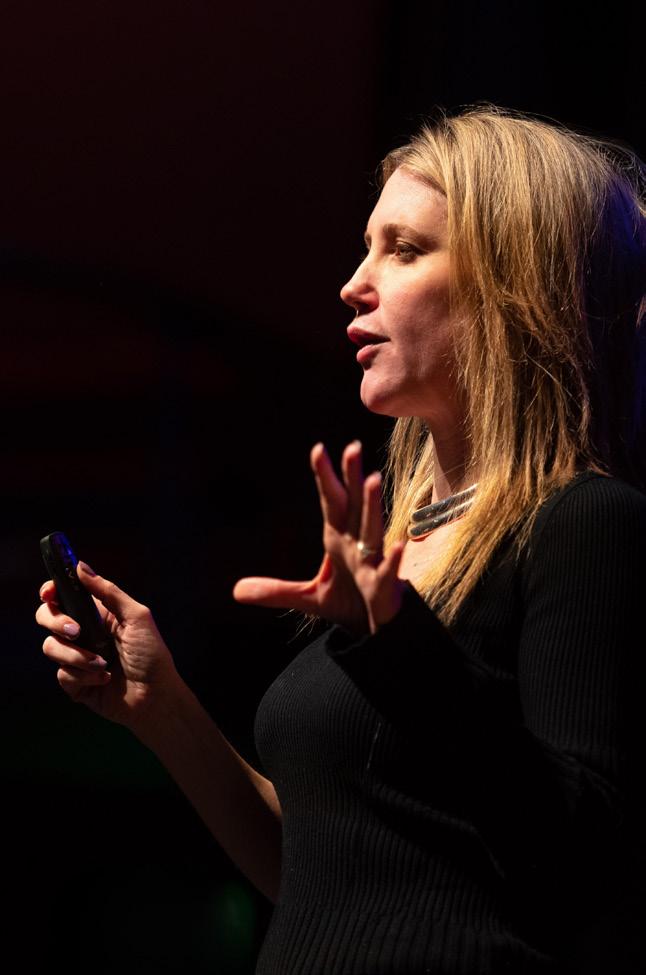
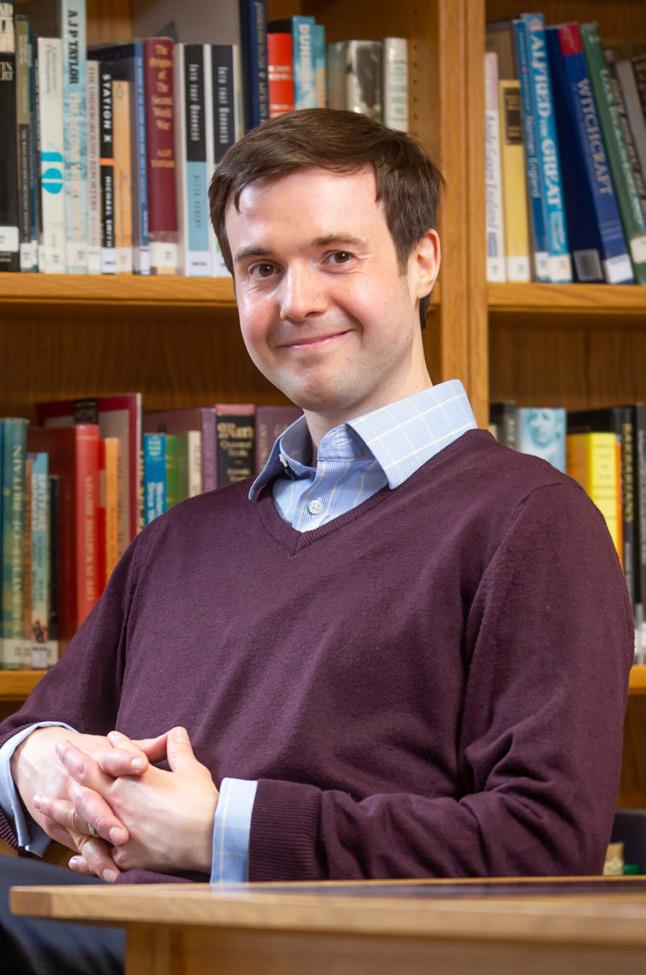
their appreciation; as one wrote following ‘Trends in the Teen World’: “Chloe Combi’s expertise and her calm, measured approach to unpicking these challenges was evident from the off and met with a cyber sigh of relief from the gathered attendees.” Feedback from parents has been greatly appreciated and has helped to shape the series. Typical of the tone are the following responses from parents: “Talking Heads provides a valuable window into some of the gritty topics that Radley addresses with the boys” and “great advice on subjects we should all thinking about as parents.
Listening to these issues being discussed frankly makes you appreciate how real they are in the modern world.”
It is an inevitable irony of our times that the murky online world that can so impact adolescent life for the worse is also the tool with which said impact can be addressed through community and conversation. Combi mentions in Generation Z that “one of the problems teenagers face is that they feel that they are living in a world that doesn’t understand them.” We hope that Talking Heads might help our families bridge those barriers.
Dr Maryhan Baker
Chloe Combi
William Wadsworth
A Positive Exchange
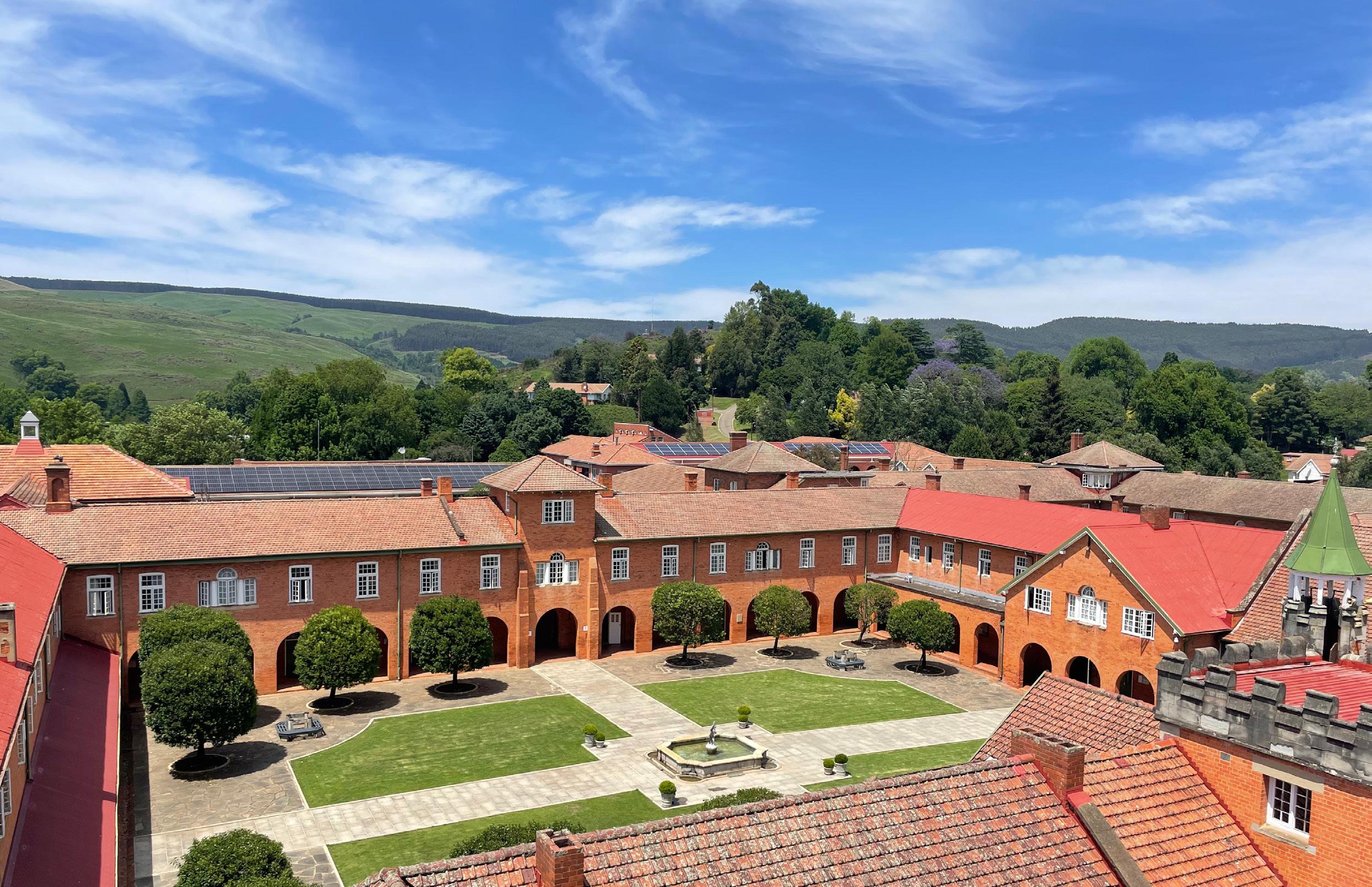
Aschool can progress little in isolation – like students, establishments learn, improve and flourish from collaboration. Radley’s Partnerships schemes with primary and secondary institutions across Oxfordshire are an important example of this, facilitating important mutual support on a local scale, yet the College’s international status also allows for further-reaching cooperation.
Just east of Lesotho, among the grass-green pastures of South Africa’s Balgowan Valley, sits the prestigious Anglican boarding school Michaelhouse, founded in 1896 and now home to over six hundred boys across ten boarding houses.
As Radley’s founding party hoped to “surround the boys with an atmosphere breathing greatness and goodness”, Michaelhouse’s sought with their venture to “make, not accountants, not clerks, not clergymen, but men; men of understanding, thought and culture.” Alignment begetting alliance, Radley College welcomed Michaelhouse’s housemaster of ‘East House’ Linda Shezi (pictured right, between the Warden and Sub-Warden) last autumn, a gesture to be reciprocated this Summer Term with a three-week visit to South Africa by B Social Sub-Tutor, Luke Wilson (middle photo). We spoke with the two teachers about this new collaboration and how the schools may learn from the staff exchange.
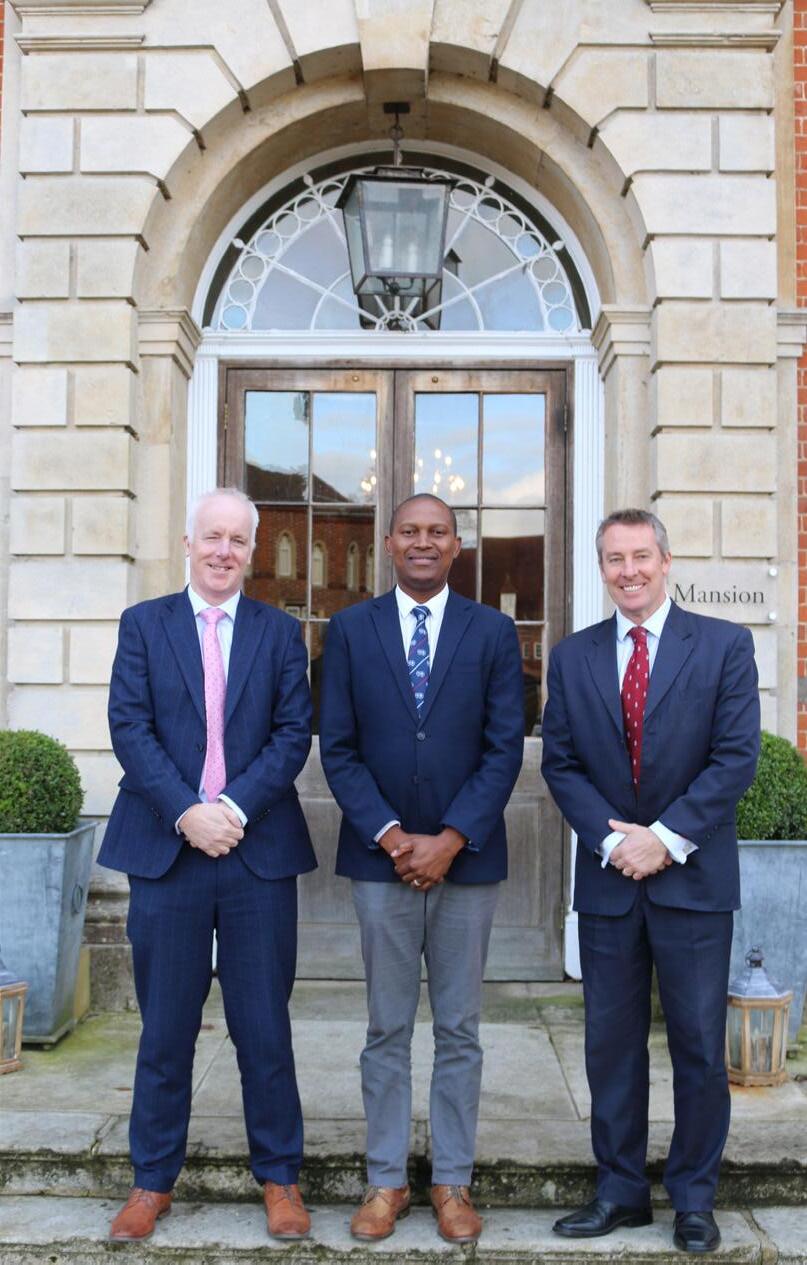
Linda: Radley College is truly an exceptional place, renowned for its academic excellence and strong sense of community. From the moment I arrived, I was struck by how welcoming the boys and staff were. There was an immediate sense of warmth and inclusion that made me feel right at home. The staff’s dedication to fostering a supportive and stimulating environment is evident in everything they do, from their engaging lessons to the attention they give to each individual student. The boys, too, exemplify a spirit of camaraderie and respect, making the atmosphere truly special.
Luke: Speaking to Linda while he was at Radley, it was clear he learnt a huge amount from his time here; he was excited about the ideas he was taking home. At Radley, like Michaelhouse, we are lucky to be steeped in tradition, but still nimble enough to change where it is beneficial. A key part of doing this is looking beyond the gates, borrowing ideas from elsewhere and moulding them to our own context.
Linda: Radley stands as a world-class institution, and its reputation is welldeserved. The facilities are state-of-the-art, and the emphasis on holistic education –balancing academia with sports, arts, and character development – is truly remarkable. It reminded me a lot of Michaelhouse,
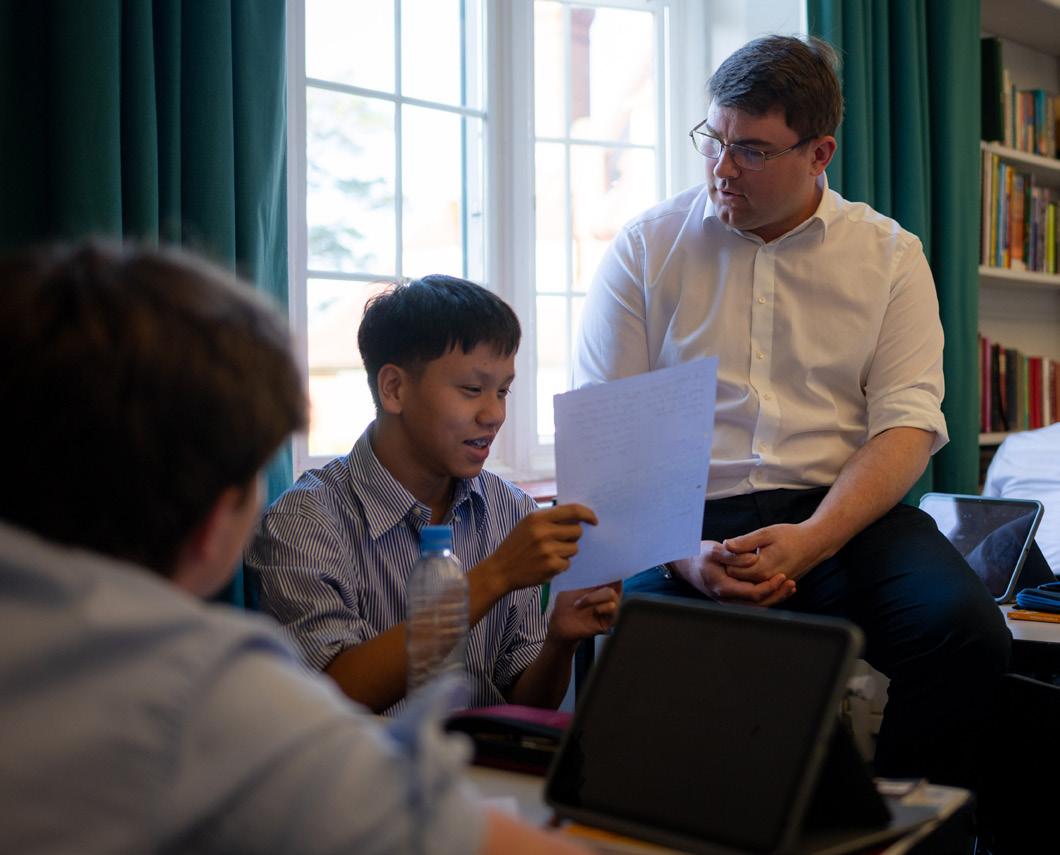
another incredible school that shares a similar commitment to excellence.
Luke: We are lucky to be able to look beyond the gates regularly through our partnerships, though these schools are necessarily quite different from our own. As such, the chance to see a school so similar to Radley, and yet in such a different context and culture, wasn’t one I wanted to miss.
Linda: I am deeply appreciative of the opportunity to visit Radley College. Not only did I learn so much about the institution itself, but I also gained valuable insights into the wider world of education. My visit was a rewarding and enriching experience, one that I’ll carry with me for a long time. I will forever be grateful to Michaelhouse, especially the Rector Antony Clark (Head of Michaelhouse, pictured below right with Linda), for this opportunity. To Niall Murphy and Angela Jonsson (Rector’s PA at Michaelhouse), thank you for everything you did for me.
Luke: While I am at Michaelhouse, I hope to be able to immerse myself in the life of the school. Like us, they are a full boarding school in a rural setting; I am looking forward to seeing the similarities in the classroom, boarding house and elsewhere and seeing what they do differently. I hope to bring back plenty of ideas . . .
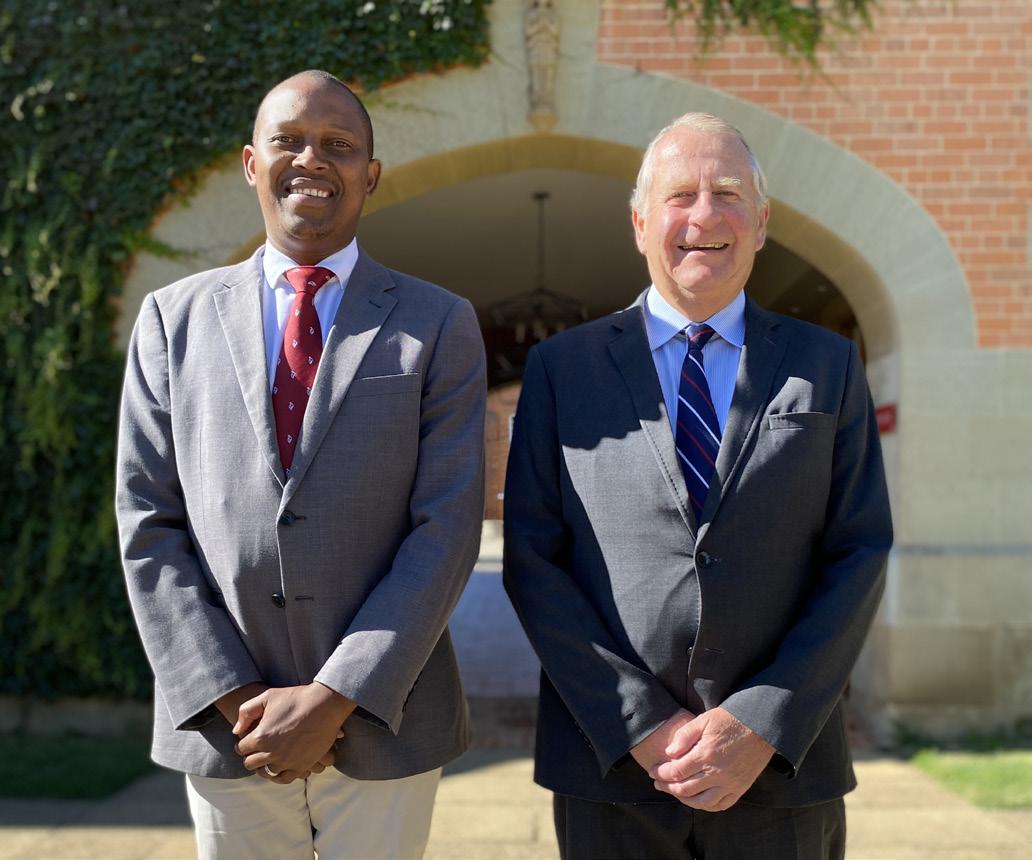
IN OTHER NEWS...
14
Radleians received Oxbridge offers
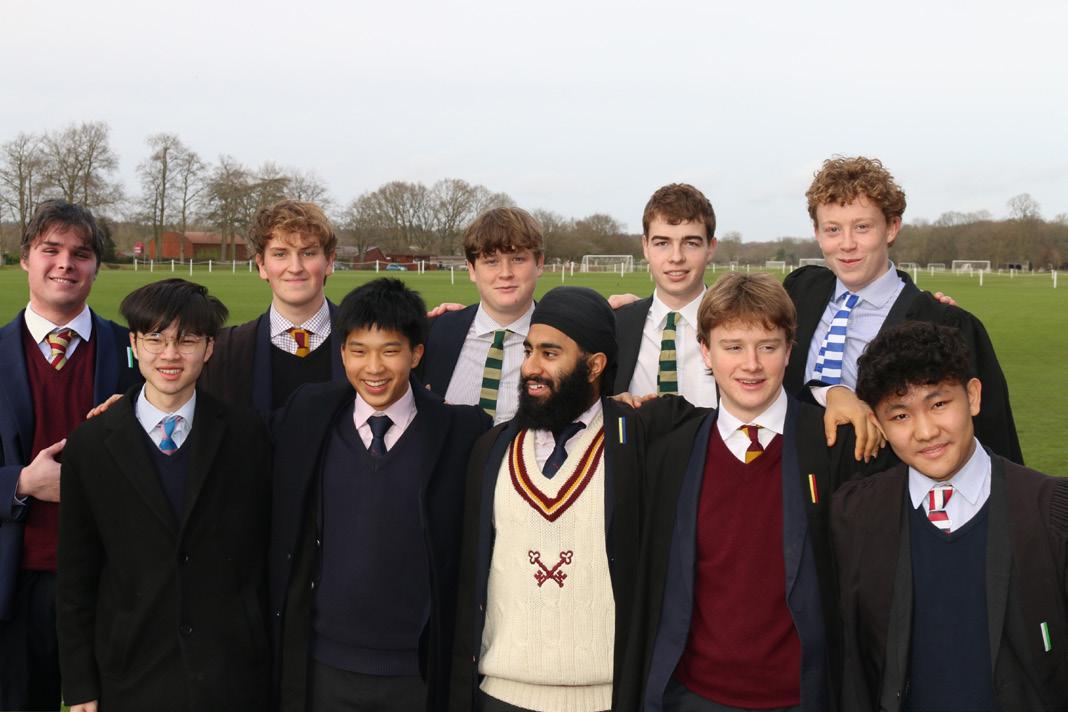
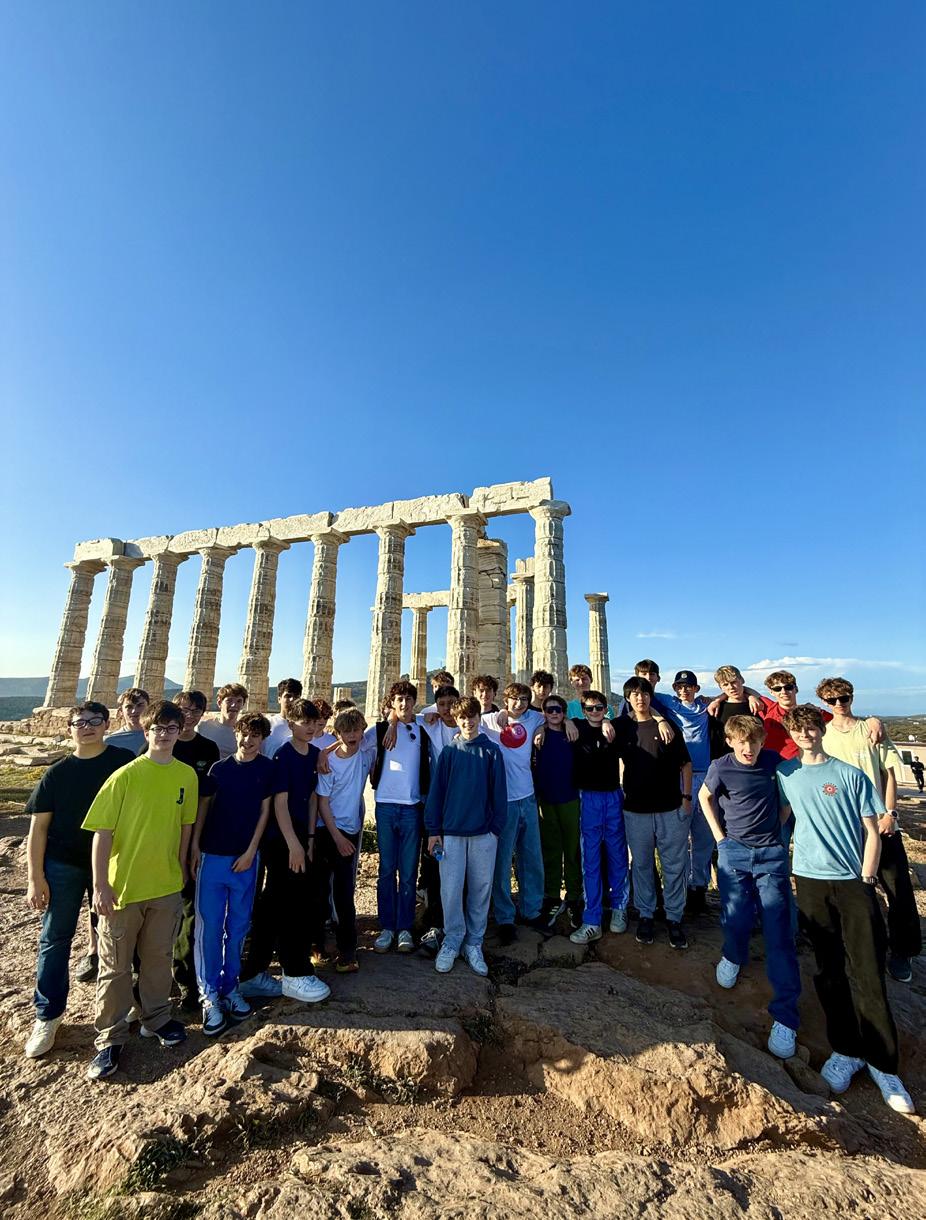
Radleians enjoyed educational visits abroad, from German lessons in Salzburg and music tours of Salamanca, to Classical readings in Ancient Messene, and tennis on the lawns of La Manga.
The Inter-Social Ergo Competition saw Francis (6.1, A) claim the biggest individual score of the night of 385 metres. E Social were victorious overall.
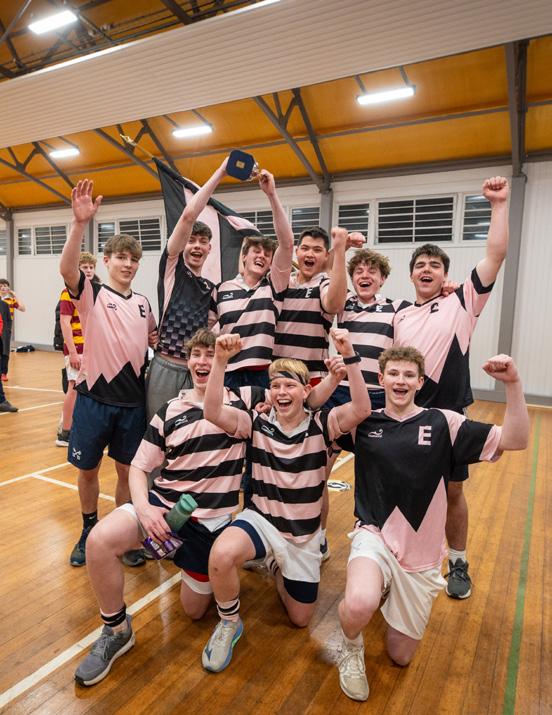
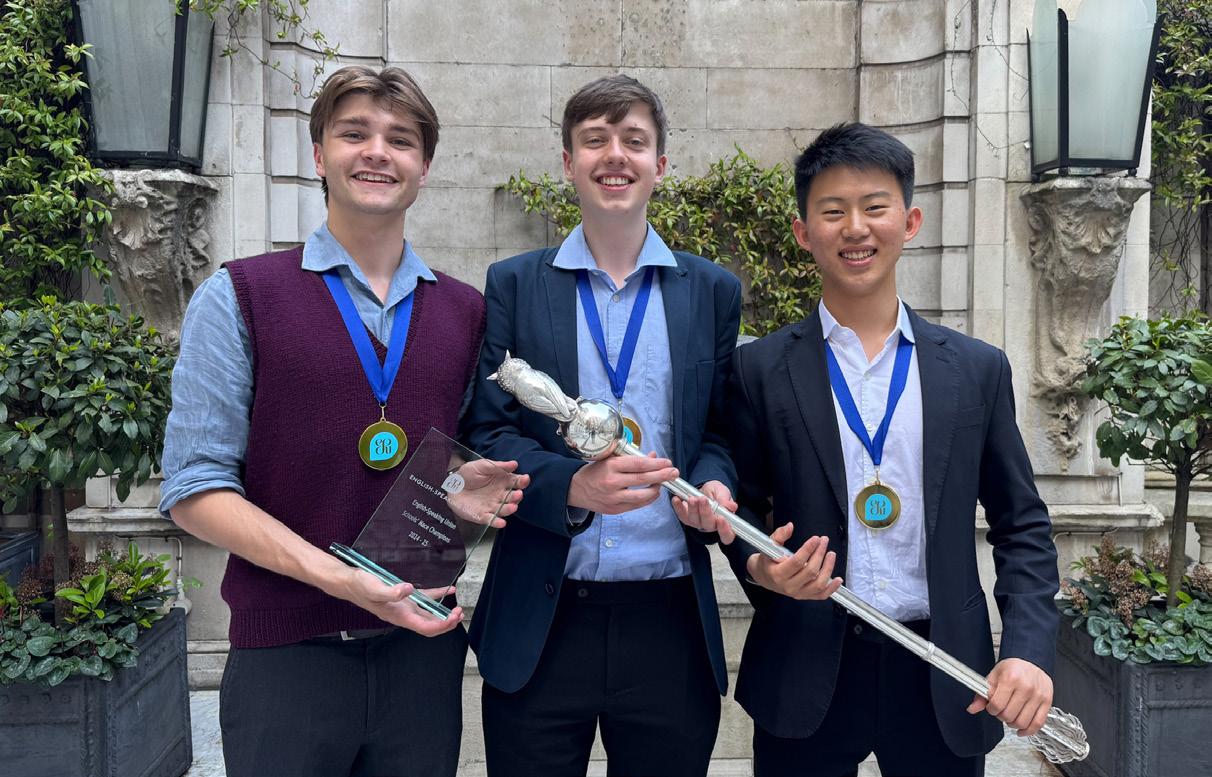
The Radley debating team of Blake (6.2, A), Mikolaj (6.2, G) and DingDing (6.1, D) were crowned the national grand champions of the English-Speaking Union Schools’ Mace competition.
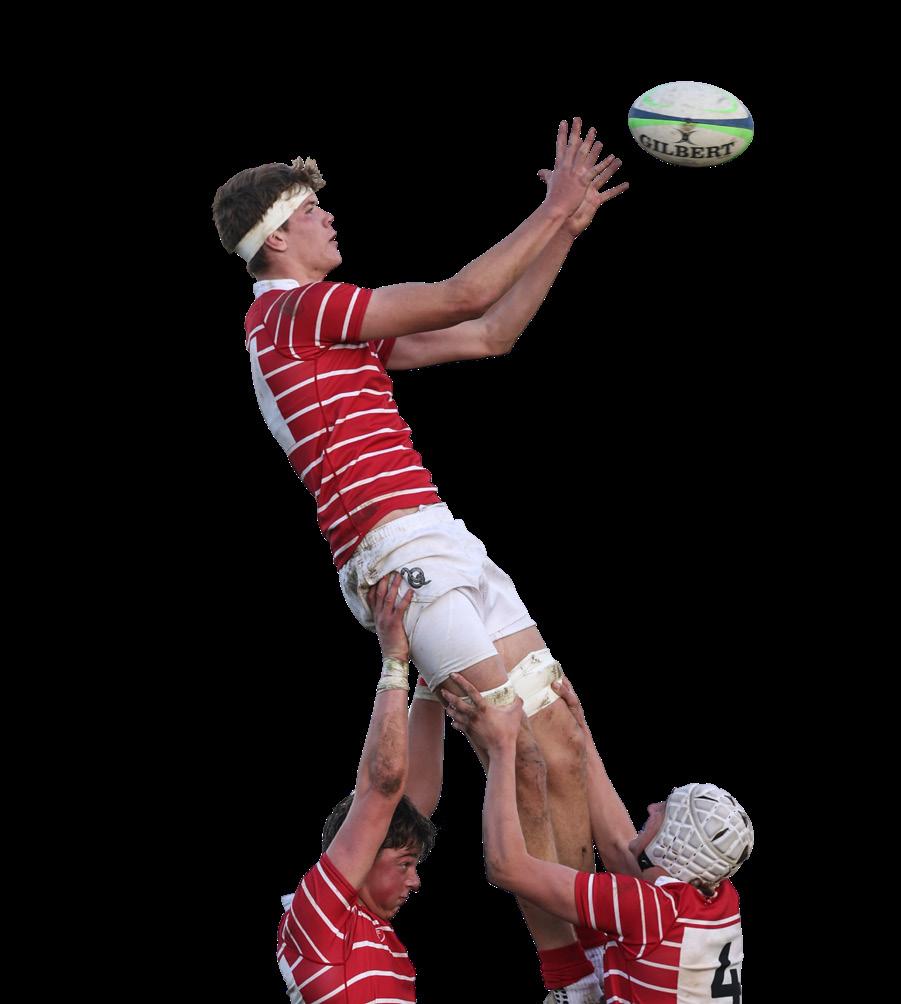
Jonno (6.2, B, left) signed a contract to play for Gloucester Rugby for the next three years, while Oscar (6.2, E, right) was selected on the bench for the club’s Premiership Cup game against Hartpury College in February.
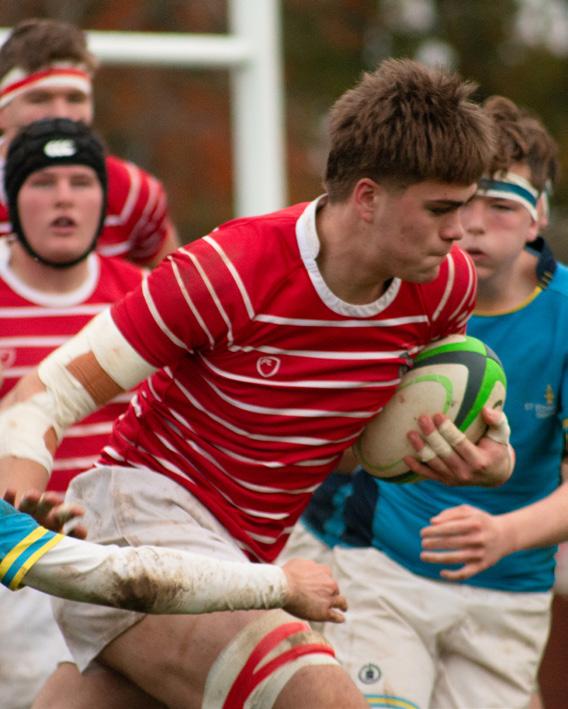

For the third time, Radley qualified for the VEX Robotics World Championships in Dallas, with teams ‘Icarus’, ‘Ibex’ and ‘Ringo’ startling the opposition at the national heat.
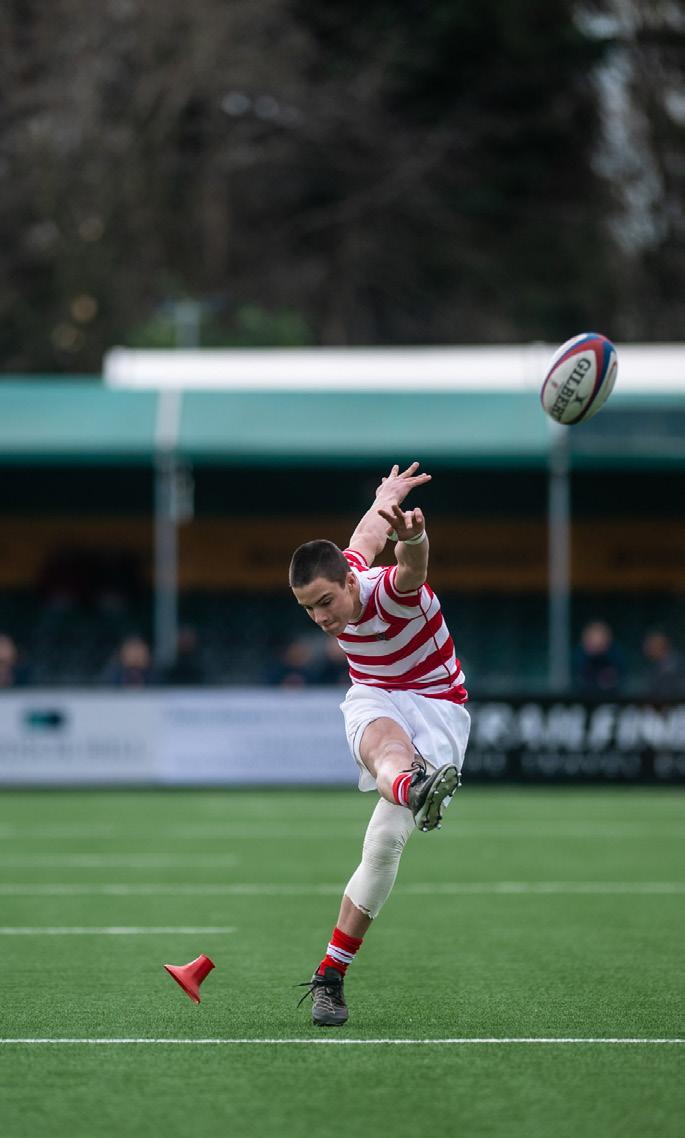
Continental Tyres U15 Plate Champions
Two Radley quartets, guitar and saxophone, reached the U19 senior finals of the Pro Corda National Chamber Music competition.
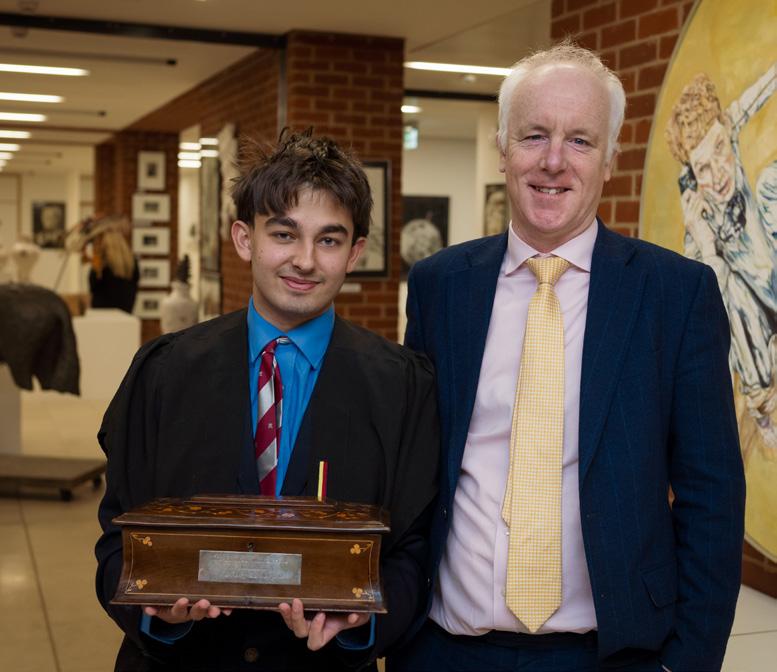
Kumar’s (V, F) reading of Harlequin and Ticktockman by Harlan Ellison made him the Victor Ludorum of the annual Declamations 2025 competition for the second year running.
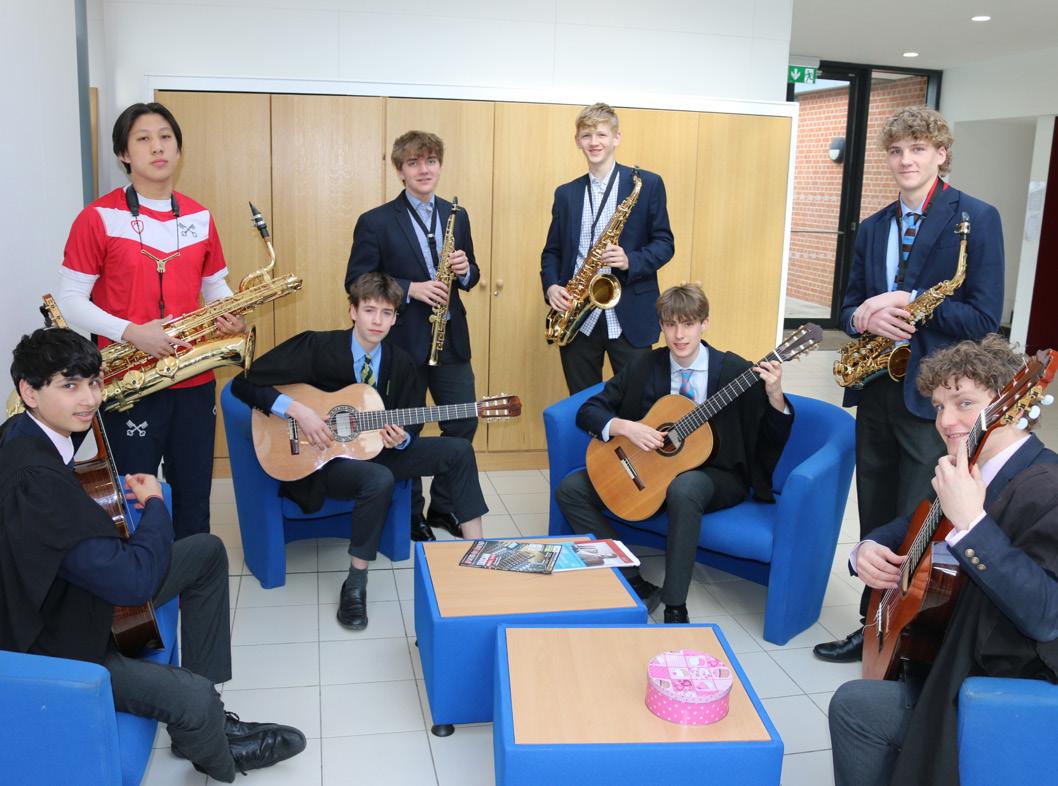
In the most recent run of ABRSM music exams, all Radley boys received merits and distinctions, with two thirds of the boys achieving the latter – a remarkable achievement given that the students currently do not have an actual Music School building!
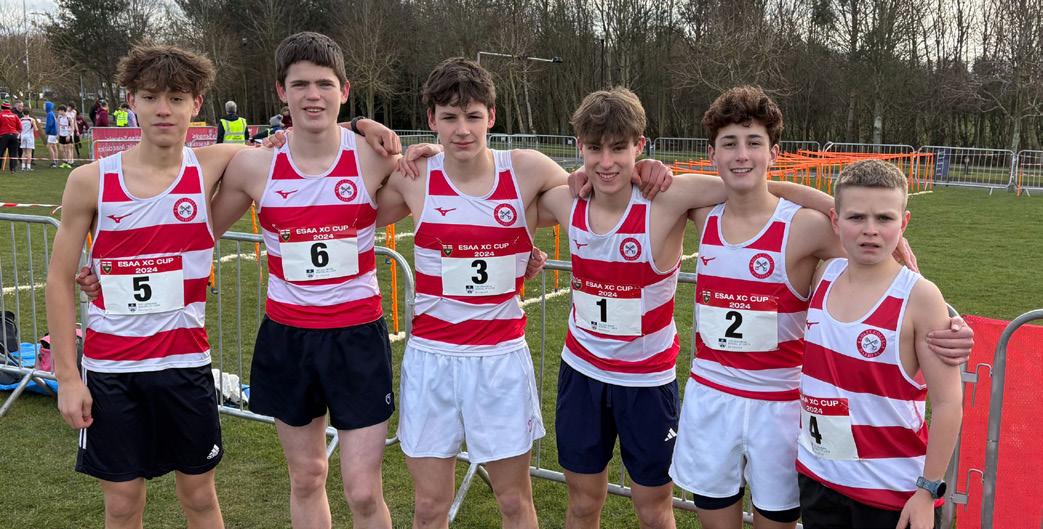
The College Harriers team qualified for the National Cross Country Cup Final for the first time in Radley’s history.
Kelvin (6.1, C) turned in a fantastic performance in the British Mathematical Olympiad, his scores of 57/60 and 36/40 in the two rounds making him one of the overall top ten entrants. He also was also part of the UK team in the 16th Romanian Master of Mathematics in February.

